Archived Blog Posts
4 Advanced Home Maintenance Tips to Save You Thousands of Dollars in Property Damage: SERVPRO of Forsyth & Dawson Counties
3/9/2022 (Permalink)
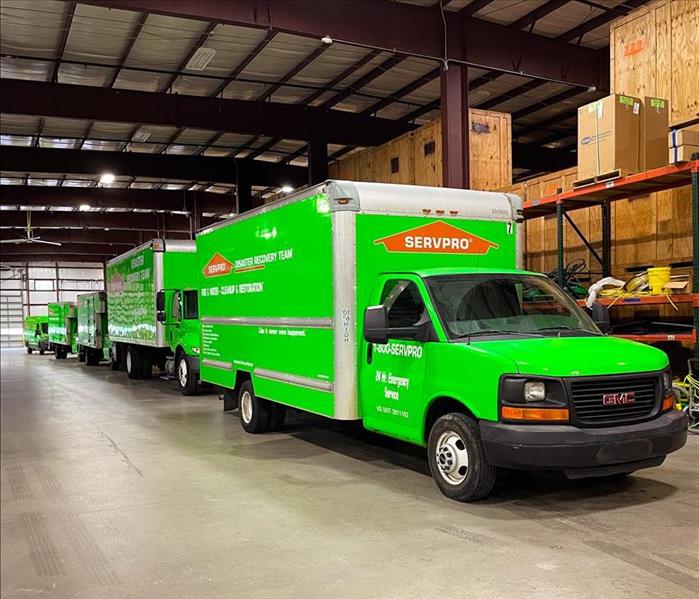 SERVPRO of Forsyth & Dawson Counties keeps its trucks ready to respond immediately to your water damage emergency.
SERVPRO of Forsyth & Dawson Counties keeps its trucks ready to respond immediately to your water damage emergency.
Did you know? An average of 14,000 people experience home water damage emergencies every day.
Water damage is a serious problem that can be expensive and inconvenient in your home or business in Sharon Springs, GA. SERVPRO of Forsyth & Dawson Counties frequently finds that careful housekeeping may help to minimize the danger and costs of water damage repair. The process of water damage restoration, while unpleasant, may be reduced by implementing some basic housekeeping techniques.
1) Inspect & clean the HVAC condensation lines to prevent leaks or flooding.
HVAC condensation lines tend to leak water when clogged and on especially hot months, this can cause water damage and flooding in surrounding areas of your home. Inspect your condensation lines every month and clean them as needed.
You should pour one-half cup of plain, white vinegar four times a year down your condensate drain to clear out gunk and debris. Bleach should not be used since it might spill onto your metal drain pan and cause deterioration and issues. If you find excessive debris or mold, our SERVPRO professionals can help you cleanup any water damage.
2) Inspect and clean the roof and gutters of debris and check attics for signs of water damage.
Clogged gutters can cause rainwater to back up and overflow onto your roof, which can damage the roofing material and seep into the home.
Check for leaking flashing around vents, valleys, chimneys, pipes, and skylights. Any place where your roof has holes or joins is a potential source of leaks later on down the road. If this flashing becomes bent, rusted, or loses its seal, it might allow water to enter your property.
Examine your attic for moisture or mold growth. If you detect damp, damaged, or moldy insulation, rotted or discolored boards or ceiling panels, or puckering in the sheetrock, you may have a leak on your hands.
3) Have a professional inspect your plumbing system
One of the best ways to avoid needing emergency water repair is by scheduling plumbing maintenance. Maintenance allows a plumber to check your plumbing system for any developing corrosion or pinhole leaks that you may not notice otherwise. They can also try to determine when your plumbing system will need repairs, so you aren't caught off guard by any water leaks in the future.
Meanwhile, avoid flushing unusual or insoluble objects down toilet drains to prevent clogging that leads to floods. If you experience three or more water leaks in less than six months, your pipes may need to be replaced.
4) Test your sump pump thoroughly for possible water leak issues
A sump pump protects your home from heavy rains and rising waters that leave behind enormous repair costs and structural damages.
Conclusion
It is important to be proactive about home maintenance and repairs in order to prevent water damage events from happening in the first place. However, if a water damage event does occur, it is important to have a plan in place for how to deal with the aftermath. Our team of experts at SERVPRO of Forsyth & Dawson Counties is Here to Help!
Call us today: (770) 887-1962
Keep the Ambiance, Ditch the Danger — Alternatives to Traditional Candles
2/21/2022 (Permalink)
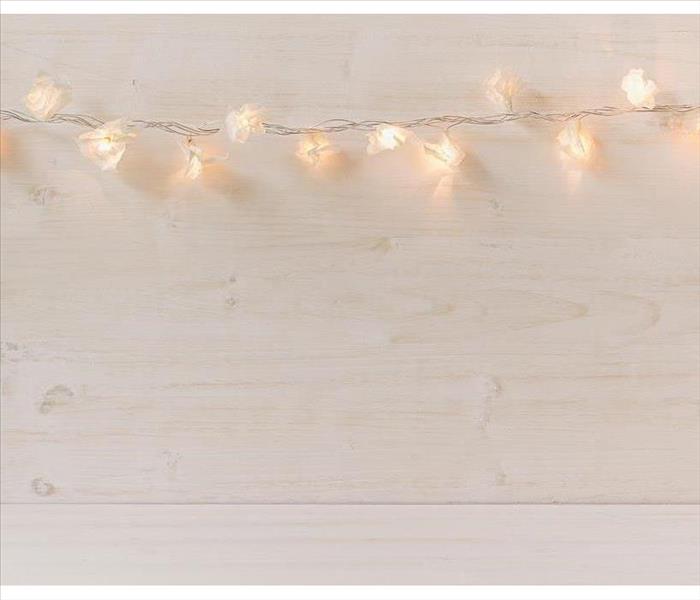 Fairy lights provide the same relaxed lightning that candles offer.
Fairy lights provide the same relaxed lightning that candles offer.
Four Alternatives to Traditional Candles
Whether you live in Hollywood or in Ludville, GA, candles have long been portrayed as the go-to option for setting the mood. But the movie fantasies neglect to mention the dangers of having open flames all over your bathtub, furniture, counters or patio: In a recent five-year period, instances of candle fire were reported 23 times a day and 37 percent of fires began in the bedroom. Add to that the soot and smoke cleanup required for your carpets and you might want to look elsewhere for ambiance. Here are four alternatives you can use every day in your home.
1. Fairy Lights
These twinkling strings of lights that are smaller than traditional holiday tree lights are frequently featured in your favorite social media posts. They are often available with energy-saving LED bulbs, many are battery-operated, and some come with remote control.
2. Flameless Candles
People have been using these electronic candles in offices for years because they provide great aromas without flames. They are a sneaky way to get the appearance of candle fire without worry.
3. Wax Melters
Sometimes referred to as candle warmers, these electric plug-in devices gently warm candle wax without flames. Bonus: They come in a variety of colors and some have side panels that transform a simple pot into a decorative lamp.
4. Oil Diffusers
Available in nearly every home store, these jars can be filled with rotating scents depending on your mood. Simply replace the reed sticks and pour in a new fragrance oil for worry-free air freshening. The best part about these is you can fall asleep without the worry of batteries dying, wax drips, or smoke cleanup.
You don't have to give up the romance of candles because you're trying to avoid a candle fire in your home in Ludville, GA. Simply think beyond the movies and pick a safer alternative.
What to Do About Water Damage Until Help Arrives
2/14/2022 (Permalink)
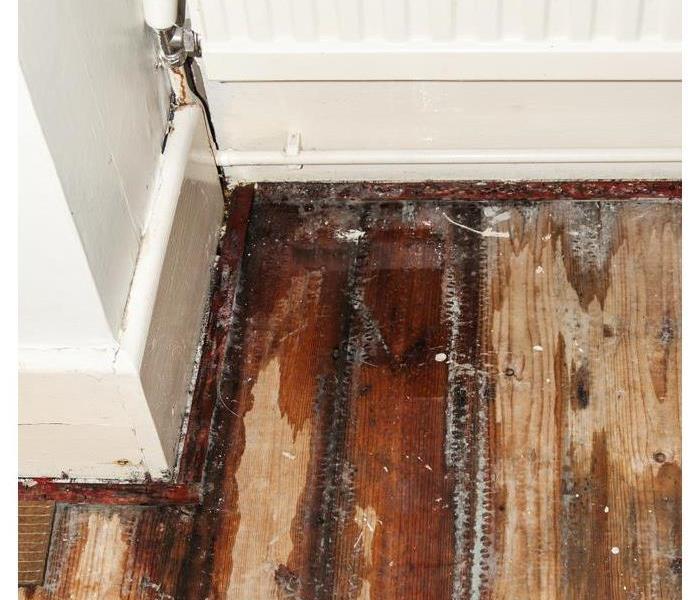 Water damage in Talking Rock, GA.
Water damage in Talking Rock, GA.
Water Cleanup
Dealing with water damage in Talking Rock, GA can be complicated. Regardless of if the broken pipes only affected one room or if the entire house needs to be dealt with, you always want to contact a professional team to come out and address the issue. You do not want to make the situation worse by trying to fix pipes on your own; leave the water cleanup to the experts.
1. Determine If It Is Safe to Stay in the House
At the end of the day, you want to ensure everyone in your family is kept safe. This requires you to determine what the “slip and fall” risk is within the house. You also need to be incredibly wary of electrical fixtures affected by the flood water. Stay out of any rooms where the ceiling is sagging, and do not turn on a ceiling fan if that is the case, because water damage can make fans unstable.
2. Ventilate the Rooms
You can help the professional water cleanup crew by beginning the ventilation process as soon as you can. You should open up any windows in the room and run the air conditioner. This will help dry down the room and delay mold growth. It will not prevent mold and mildew entirely, so you still need to contact a professional team to address every danger in a room.
3. Salvage What You Can
You do not want to put yourself in any danger by reaching into potentially contaminated water, but you can attempt to retrieve items affected by water damage. Wet fabrics can be removed and hung outside to dry. You can also pull out magazines and books to help the pages dry sooner. Do not plug in any electronics until you know for certain they are dry. Water remediation in Talking Rock, GA can be dangerous work, so leave the heavy lifting to the experts.
Flood Cleanup: Mitigation Versus Restoration
2/2/2022 (Permalink)
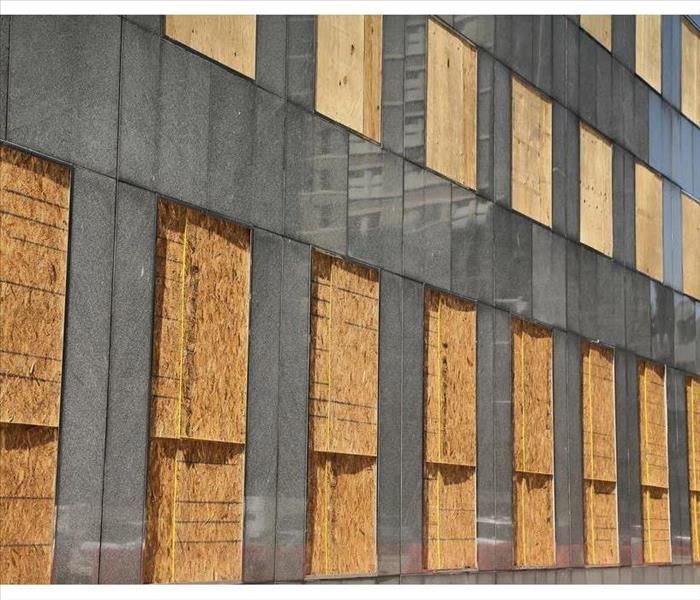 Board up building services to a building in Mcdaniel, GA.
Board up building services to a building in Mcdaniel, GA.
Mitigation vs Restoration
When your business has been flooded, you are likely going to hear a couple of terms thrown around: mitigation and restoration. These terms refer to the initial cleanup and rebuilding of your business so that it is functional. You have the option of either going through several companies that specialize in the individual tasks associated with the overall rebuilding of your business, like a flood cleanup company, or choosing a restoration firm that specializes in the full-scale process. In either case, it is beneficial to understand the terms and what they entail.
1. Mitigation
Mitigation refers to the first aspect of flood cleanup, and it is the process of protecting your facility from further damage that may nullify your insurance claim. There are two processes commonly used in the mitigation process.
1. Board Up and Tarping
Boarding up refers to the covering of broken windows, doors and other structural holes with plywood. Tarping refers to the covering of any holes in the roofline with tarps.
2. Initial Cleanup and Cleanout
Once the area is secure, a flood cleanup company will move on to removing excess water and other debris. This process will be followed by the cleaning and disinfecting of the affected areas.
The mitigation process is the first and fastest part of the restoration process. Mitigation creates a clean and safe environment for restoration specialists to assess and remedy the rest of the disaster area.
2. Restoration
A restoration company in the Mcdaniel, GA, area is likely all-encompassing, meaning that it will be able to perform the mitigation work as well as the restoration. The restoration process is lengtheir than mitigation and probably involves demolition and construction.
A flood cleanup company may only specialize in the mitigation part of disaster recovery, while a restoration company may be able to work on every aspect of the project. While you are welcome to pick whichever service suits your needs best, a restoration specialist is likely the best option in major disasters.
Don’t Get Short-Changed on Your Burst Pipe Claim
1/26/2022 (Permalink)
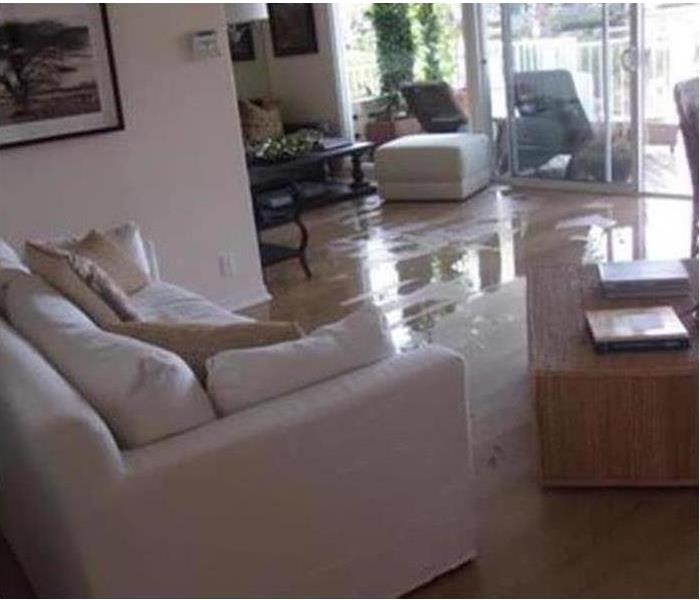 Bursting pipe causes damage in a living room.
Bursting pipe causes damage in a living room.
Don't Let Your Claim For a Burst Pipe Go Unpaid
You care enough about your home in Jasper, GA, to protect it with an insurance policy covering water damage, but are you sure you’ll fully recover your losses if bursting pipes unleash buckets of water inside your home? Here are some ways you can help ensure you won’t come up short.
1. Document Everything — Before and After
Before taking steps to fix broken pipe damage, document everything affected. Don’t throw away anything that’s been damaged beyond repair; take pictures of everything first or make a video.
It’s a good idea to also take photos or videos of your house and belongings when you first get your policy or when you make changes to your home. A before-and-after damage demonstration can help substantiate your claim.
2. Know What Your Policy Terms Mean
Be aware of any exclusion and exception terms in your policy. Find out from your agent what all the terms mean; certain types of damage from bursting pipes may not be covered. Water damage from long-term gradual pipe leakage, for example, may be excluded; only sudden or accidental damage may be covered. An adjuster could then conclude that damage reported in a claim could have been prevented if you had not neglected certain maintenance, inspection or repair issues.
3. Be Proactive; Get Inspected and Have Maintenance Work Performed
To help prevent a claim denial based on gradual or long-term leakage, have your plumbing system inspected regularly by licensed professionals. Obtain inspection reports and keep records of all maintenance or repair work performed.
4. React Quickly and Call In a Reliable 24/7 Clean-Up and Claim Inventory Service
Contact a professional 24/7 emergency clean-up service as soon as possible. You’ll want to choose one that provides a thorough and reputable contents claim Inventory service.
You’ll be better prepared to file a claim with sufficient picture and paper documentation, a full understanding of policy terms and a proactive approach to inspections and maintenance. Taking these steps can help you gain the confidence that you’ll be fully covered if your home in Jasper, GA, is damaged by bursting pipes.
Commercial Fires Can Leave Lingering Problems for Building Owners
1/21/2022 (Permalink)
 Fire damage in Dahlonega, GA.
Fire damage in Dahlonega, GA.
Building Owners May Face Long-Term Issues As a Result of a Commercial Fire
After a commercial fire in Dahlonega, GA, the building can be expected to need a good smoke cleaning by professionals to remove the stains left behind by the soot and dark fumes of billowing smoke-filled clouds. But weeks or months later, an unexpected smoky or acrid smell may arise. That is when most people ask themselves what happened.
Dark Stains
Discoloration can generally be removed by a team of fire specialists. Using specialized cleaning methods and chemicals, the team can often quickly remove the damaging stains from the walls, floors, and ceilings. Once the stains from the smoke damage have been removed, the building can quickly be reopened for business.
Unpleasant Odors
What many people do not realize is that a general smoke cleaning only removes surface pollutants. During a fire, flames can send out gas fumes as they consume items. The gases may include the following:
- Hydrogen cyanide
- Carbon monoxide
- Phosgene
- Hydrogen Chloride
- Nitrogen Dioxide
As the fumes penetrate the surfaces of most porous items inside the building, they become hidden by the more offensive nature of the smoke and soot. Once the surface smoke and soot are removed, the gases typically become noticeable.
Specialized Cleaning
Fire and smoke restoration specialists can fight the noxious and offensive smells left underneath the smoke odor with air cleaners. These include ozone machines, air filtration devices, and thermal foggers. By initiating a full area air cleaning along with the surface cleaning, your building can typically be returned to normal quickly when the majority of offensive odors have been removed.
Smoke cleaning is important, but it is only part of the cleaning often necessary to fully remove the offensive and lingering gases trapped in the interior of your commercial building. It is often best to look to a restoration team right after the fire to minimize the hold the odors may have on your property.
SERVPRO of Forsyth & Dawson Counties- Proud to be awarded
1/20/2022 (Permalink)
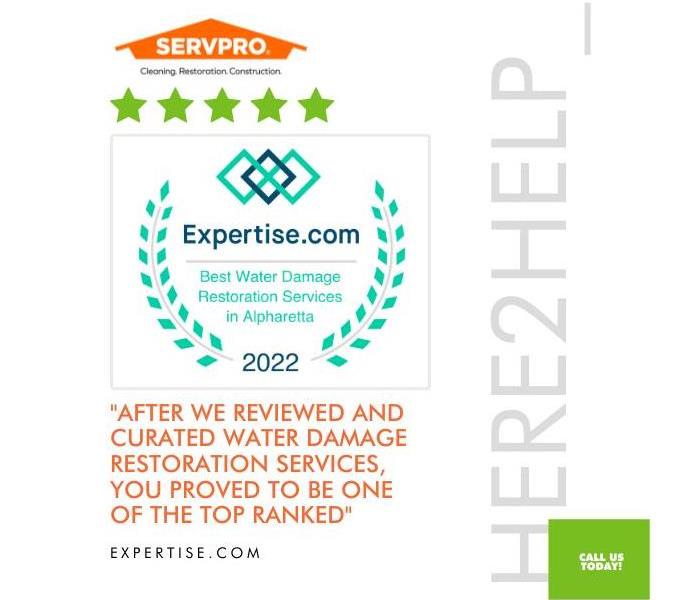 Expertise.com Award for excellent water restoration services
Expertise.com Award for excellent water restoration services
A water-related disaster in your home or business in Coal Mountain, GA is stressful, no matter the size. While you might hope that this would never happen to you, the truth is that it happens more than you think. If your home or business has ever experienced water damage or if you know someone who has, you’re likely well aware of how much damage even minor flooding can cause—and how long it can take to restore things back to normal.
The Award: Water Damage Restoration Services in Coal Mountain, GA
Our Water Damage Specialists use advanced water restoration techniques. So if you need help with everything from unclogging a drain, to restoring your home after a second-story toilet overflow, we have the capacity to do it. We specialize in removal and extraction, drying and dehumidification, cleaning and repair, and restoration services, for residential and commercial properties alike.
Our commitment to quality of service and workmanship has earned us an A+ rating from Expertise.com.
Water Removal and Extraction
When water damage occurs, it’s important to start by removing and extracting as much of that water as possible. If not taken care of quickly and properly, water can lead to more extensive – and expensive – problems later on. At SERVPRO of Forsyth & Dawson Counties, we offer a variety of services that include water removal and extraction. Our teams can handle everything from small leaks in your basement or garage to large-scale disasters such as floods caused by storms, wind, or hurricanes.
Drying and Dehumidification
For a water damage restoration company, drying and dehumidification are crucial steps in a restoration project. If water is left sitting in a home or business, mold will begin to grow and spread—destroying walls, floors, and furniture in its path. Our At SERVPRO of Forsyth & Dawson Counties technicians make sure that atmospheric humidity levels are contained to 30-60% relative humidity and salvageable materials are dried and cleaned to preloss conditions before beginning the next steps in our water damage restoration process.
Restoration Services
Here at SERVPRO, we know that you don’t want to repair your home; you want it restored. Our water restoration technicians will work with you and your insurance company (if applicable) throughout every step of restoring your property to its preloss condition. We understand how stressful and frustrating water damage can be – but we also know that our dedication and expertise will help minimize stress and bring closure during a very difficult time in your life.
Call us today at (770) 887-1962 for 24/7/365 service. We are Here to Help.
Flooded Streets and Vehicles: Why You Shouldn't Drive Through Floods
1/12/2022 (Permalink)
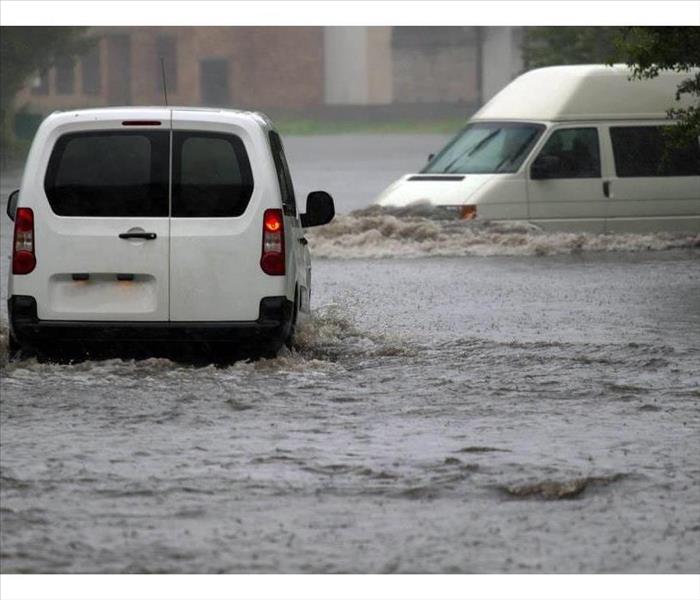 Avoid driving through flooded streets.
Avoid driving through flooded streets.
Why You Shouldn't Drive Through Floods
A flooded home is one thing. There is an understood protocol in dealing with a flooded home, and it is to stay dry and call emergency restoration services in the Dawsonville, GA, area after the damage is done. But, flooded roads offer a different and deceiving problem. A flooded street that looks intimidating to walk down may not look that scary from the inside of your vehicle, but floodwater should never be underestimated.
1. Depth of Water Can Be Deceiving
True, the water level may only be about 12 inches deep, but that level of rushing water is enough to carry a small car, and if the depth increases to 2 feet, then it can carry almost any vehicle. Despite the weight of most vehicles, it is no match to the surge and power of rushing flood water, no matter the depth.
2. Loss of Control Can Be Immediate
The second your car begins to float you have lost all control. Steering, accelerating, and breaking will do nothing to help you maneuver obstacles in the flooded street. A vehicle becomes a projectile with a passenger.
3. Water Can Flip A Vehicle
As waters rise, it is possible that your floating vehicle will roll and flip upside down, which can make it difficult and dangerous for an escape attempt. It is also important to note that the water does not have to be significantly deep to flip your vehicle. The same 12 inches that can move your car can also flip it.
4. Water Is Equally Dangerous for People
While it is dangerous to drive in a flood, it is even more dangerous to walk in a flood. That is why the essential safety and travel tips for flood zones are:
- Stay Dry
- Stay Safe
- Seek Higher Ground
If you are trapped in a vehicle on a flooded street with moving water, then stay inside your car until help arrives. If your vehicle begins to flood, then move to the roof of your car, but do not enter moving water. Flood water is dangerous, and your safety is paramount.
We’re Ready Around the Clock | SERVPRO® of Forsyth & Dawson Counties
12/30/2021 (Permalink)
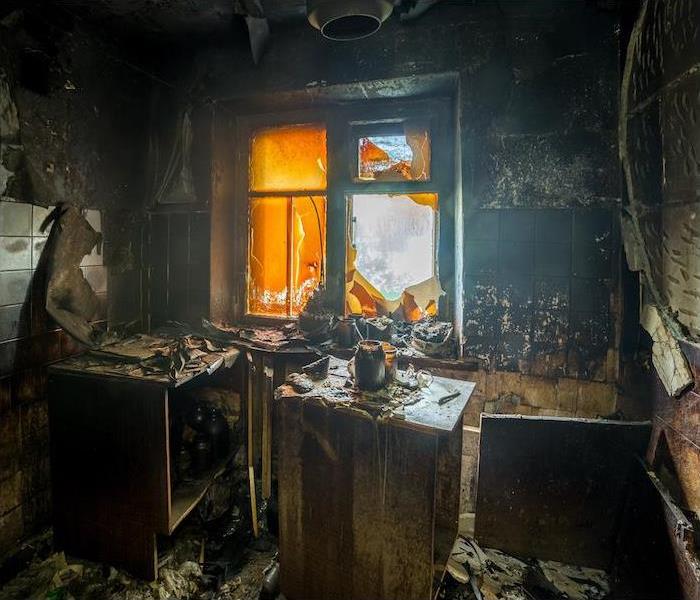 Fire damaged kitchen with soot on walls and burnt cabinetry
Fire damaged kitchen with soot on walls and burnt cabinetry
If you remember rotary phones in homes and “blue light specials” at the local big-box store, then it’s likely you’re old enough to remember a time when we did much more of something we hardly ever have to do now: waiting.
Remember sitting in a doctor’s office with nothing to do but twiddle your thumbs or check out a three-year-old magazine? Now you can video chat with your physician from home while you play video games in the background.
So much of our lives is instant now, and that’s a good thing—especially when it comes to the urgency of home damage. If something happens in the night or on a weekend to create an acute need for service, you shouldn’t have to wait. And with SERVPRO’s world-class, 24-hour emergency services, you won’t have to.
Fast service and quick action matter, and here’s why.
After a fire. Fire does much damage in the immediate, that’s plain to see. But soot, the sneaky discharge created when combustion goes uncompleted, works behind the scenes to create even more damage, and it starts only minutes after the fire.
Soot and smoke combine to create stains and smells for which there is a very limited window for repair. Once that window passes, the only recourse is to completely reconstruct affected walls to get rid of them. It’s doable, of course, but having SERVPRO on the scene right away will save you time, money and smelly clothes.
After water damage. It’s hard to miss the puddled water and dripping after a burst pipe, but it’s easy to overlook the fact that 48 hours after water comes in contact with your surfaces, mold starts growing. Mold growth presents a threat to both your health and, eventually, even the structure of your home. The faster your home can be dried and dehumidified, the better off you’ll be.
If storms or natural disasters happen in the night or on the weekend, you’ve got a sudden, acute need, and you shouldn’t have to wait until 9 a.m. the next business day to get help. When time is of the essence, we’re ready to act.
You shouldn’t have to wait for help, and when you link up with us, you won’t. Trust the team that’s Faster to Any Size Disaster. Trust SERVPRO.
When you need help after a home or business disaster, fast service is a priority, and there’s nobody faster or more prepared than SERVPRO. Call us anytime to take advantage of our 24-hour emergency service.
3 Things You Must do When Replacing a Leaking Toilet
12/28/2021 (Permalink)
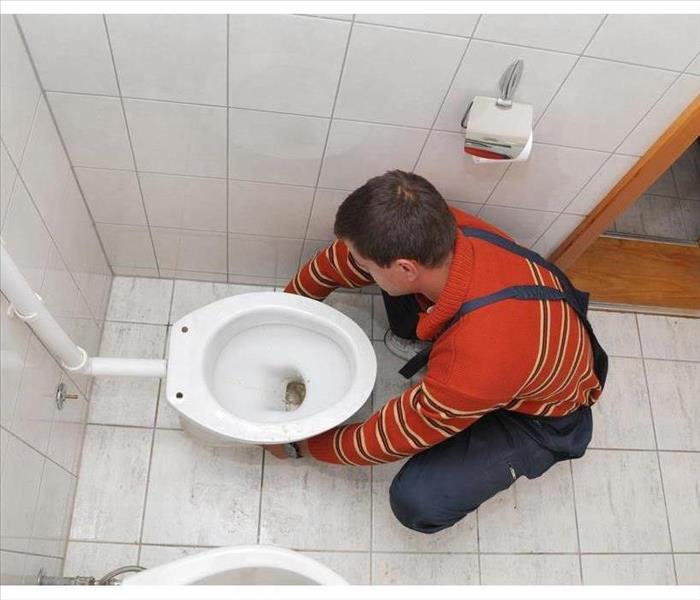 Replacing a leaking toilet in Cumming, GA.
Replacing a leaking toilet in Cumming, GA.
Three Things to Do When Replacing a Leaking Toilet
Replacing a home toilet is a doable job that requires some preparation and basic technique. If your old toilet has left you with serious residential water damage in Cumming, GA replacing it promptly is highly suggested. When you are ready to swap out your old leaking toilet with a newer model, be sure to check out these 3 important tips for a safe and smooth transition.
1. Properly Drain the Toilet
Before a new toilet can be installed, proper drainage and removal of the old fixture is critical. Start by shutting off the water supply using a wrench. Close the valve and completely drain the toilet by holding the flush handle until the water is emptied from the bowl. Continue this process until little to no water can be found before proceeding with toilet removal. Beginning with a drained toilet can:
- Prevent a messy toilet repair job
- Help to lighten the toilet before removal
- Evade further possible water damage
2. Lift the Toilet by the Bowl
After draining a leaking toilet, you must be prepared to remove the fixture from its current place. Before lifting the toilet, be sure to get a firm grip around the bowl. Never lift an old toilet by the tank. Lifting from the bowl prevents the weight of the toilet from breaking upon removal. Prepare an old sheet or piece of cardboard beforehand to catch any water that may be left inside.
3. Replace the Rubber Gasket
Once the older toilet has been taken out, it may be tempting to jump right into installing the new one. If you were dealing with a leaky toilet, it may be wise to replace the old rubber gasket before installing a new fixture. These gaskets are fairly inexpensive and can prevent serious water damage in the future.
While these helpful tips can guide you in a replacing your leaking toilet, repairing water damage in Cumming, GA is a job best left to a professional water restoration service. Always turn to a professional to help assess your water cleanup needs.
Have a Commercial Kitchen? Reduce Fire Risk with These Tips
12/23/2021 (Permalink)
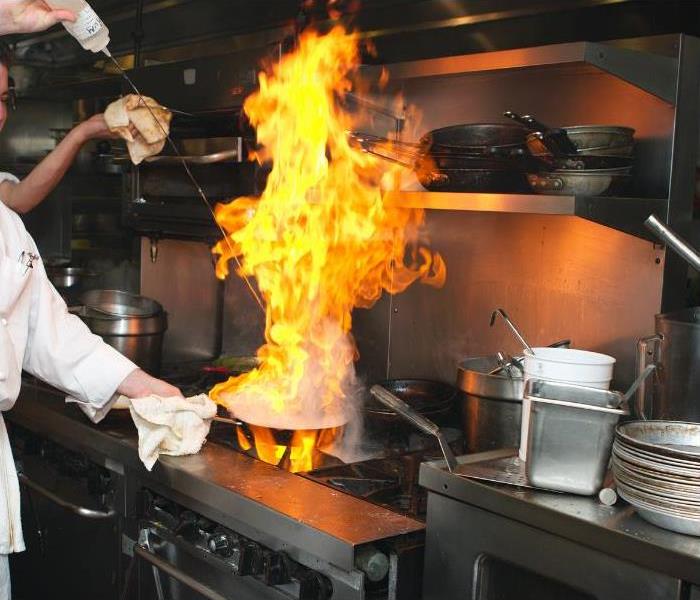 Commercial Kitchen Fire While Cooking
Commercial Kitchen Fire While Cooking
If you own a restaurant, bar or commercial kitchen in Cumming, GA or Chestatee, GA, reducing fire risk is critical to continued profitable operation. The National Fire Protection Association (NFPA) reports that fire departments responded to over 7,410 structure fires in the kitchen of restaurants and bars in 2017 alone. Most of these fires were preventable, resulting in three deaths, 110 injuries, and $165 million in property damage annually in commercial kitchens. These tips will help keep you and your staff safe while preventing shutdowns due to fire code violations.
What Are My Ducting and Air Movement Requirements to Prevent Fire?
While Chapter 7 of the NFPA 96 Standard for Ventilation Control and Fire Protection of Commercial Cooking Operations covers this extensively, here are a few key items to keep in mind.
First, commercial kitchen ducts should never pass-through firewalls, share an exhaust system with the building ventilation, or have obstructed access panels. While doing these things on a commercial kitchen remodel can save costs in the short term, the fire risk increases significantly. If disregarded, your commercial kitchen work will likely not pass inspection.
Make sure to maintain a minimum clearance of 18 inches between combustible materials and the kitchen ducts. This standard is based on Section 4.2 of the NFPA 96, however is one of the easiest to disregard once the kitchen is operational. Ducts can build up high levels of radiant heat that can ignite combustible materials like boxes, cups, plates, utensils, or other kitchen materials.
If you would like additional information on the types of combustible and non-combustible materials that should and shouldn't be kept near the duct, consult Chapter 3 of the NFPA.
What Are My Commercial Kitchen Fire Extinguisher Requirements?
"The NFPA 96 requires automated fire suppression equipment for all grease removal devices, hood exhaust plenums, and exhaust duct systems in a commercial kitchen, as well as any cooking equipment that produces grease-laden vapors." - Koorsen Fire & Security
The NFPA 96 requires use of class K fire extinguishers in conjunction with automatic fire extinguishing systems. These extinguishers also require installed placards stating their extinguisher class. However, in the case of a commercial kitchen fire, it's critical to activate the automatic fire extinguisher system before using portable-type extinguishers. This is because high-efficiency cooking appliances in many modern commercial kitchens are capable of achieving high temperatures that can raise the vegetable oils to intensely high temperatures. When oil ignites at these high temperatures, it can already be so hot that a portable extinguisher is not enough to stop the flames.
Another standard that you should familiarize yourself with is the UL 300 standard.
According to this article by Insureon, a kitchen’s cooking equipment must meet these UL 300 requirements:
- Fire-extinguishing nozzles in the hood, ducts, and above each cooking appliance
- An automatic fuel shut-off capabilities for both gas and electric power sources
- A manual fuel shut-off pull for all power sources
- A wet-chemical fire-extinguishing system that meets UL 300 criteria (one of which is undergoing semiannual checkups by a certified professional)
If you need immediate assistance after a fire, our teams are available 24/7/365. With our promise of being Faster to Any Size Disaster, you can count on SERVPRO of Forsyth & Dawson Counties to be there when it counts. Call us today at (770) 887-1962 for rapid assistance.
Half of All Businesses Never Reopen After a Disaster
11/29/2021 (Permalink)
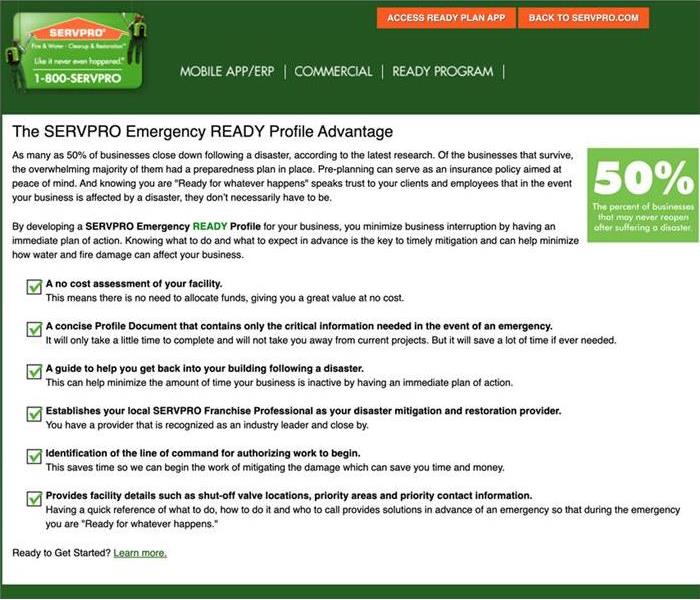 The emergency ready profile contains a wealth of information to help you get reopened.
The emergency ready profile contains a wealth of information to help you get reopened.
The only thing certain in the world today is uncertainty. Disasters in Amicalola, GA, both natural and man-made, are increasing for a multitude of reasons. After the worst has passed, studies show that 40 – 60 percent of businesses will permanently shut down. Of those who survive, the majority are prepared with an emergency profile.
Disasters Are Everywhere
There are so many potential catastrophes facing business now, they’re impossible to list. Some of the most common types include
- Natural disasters
- Fires
- Riots
- Major infectious events
- Cyberattacks
- Fraud
Each type has many subtypes, as well. Cyber-attacks may shut down a business website while ransomware can lock down an entire local operation. More than one can occur at once, and when they do, the majority of businesses are wiped out.
Resilience is Everything
FEMA says that a whopping 90% of small businesses will fail within a year if they don’t reopen within 5 days. However, the overwhelming majority of businesses that do survive have an emergency profile ready before a disaster.
Survival in Steps
SERVPRO has helped many businesses meet the FEMA-recommended standards for business resiliency. Their Emergency READY Program is the industry-leading disaster plan available. Even better, it starts with a free assessment of your facility.
Once you visit the SERVPRO ERP website, you can create an account and download the free ERP app on your smart device. You can also call SERVPRO for technical support or any customer service needs.
There’s a local SERVPRO branch in your area. You may have several to choose from, but you can pick whichever one you prefer to act as your representative to deal with insurance companies and other contractors if you wish. Then you can begin creating ERPs for every property you own.
The ERP app not only helps you with your emergency profile, it contains a wealth of information to help you get reopened. It’s available through the cloud, so if you lose access to information in your building, you’ll have it anywhere you have internet access. You’ll have all the facility information you entered at the touch of a finger!
Skip the Candle and Choose an Alternative
11/29/2021 (Permalink)
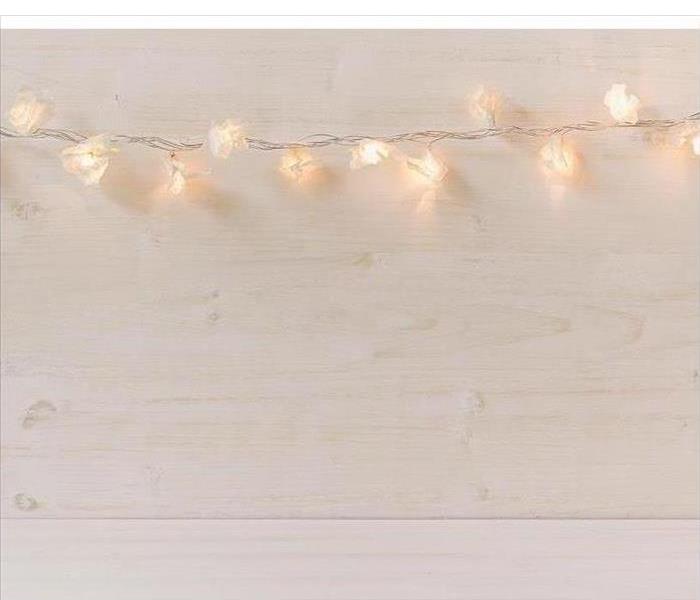 String the lights along the wall or behind a curtain.
String the lights along the wall or behind a curtain.
The Following Tips Might Be Helpful
Every year, thousands of residential fires are caused by lit candles. Although the tiny flame at the end of a wick doesn't look dangerous, it doesn't take much for a candle fire to get out of hand. If you have a lit candle at home, use these tips from the National Fire Protection Agency to avoid a fire:
- Place the candle at least 1 foot away from anything flammable, including loose clothing.
- Use sturdy candle holders that won't easily tip over and place the candle on a stable surface.
- Don't allow the candle to burn all the way down.
- Don't leave children and candles (or matches) alone in a room.
- Always blow out a candle before leaving the room.
- Don't burn candles in the bedroom.
These tips can help you use candles safely in your Dahlonega, GA, home. However, you can get the same cozy flicker without the risk of an open fire when you choose to use alternatives to candles.
Battery-Powered Candles
This alternative looks like a candle, and the artificial flame often mimics the real thing. The batteries tend to last for a very long time, and sometimes there are options that are scented. The major benefit of using these candles is that you can completely avoid a candle fire. Of course, you may also save some money because you won't have to replace the candles that melt.
String Lights in a Clear Container
A clear wine bottle, vase, or other clear, glass container makes a beautiful light when you fill it with a string of lights. This option has been popular lately, and crafters have paired string lights with containers in a lot of festive and homey ways.
Fairy or String Lights
You don't have to put the lights into a container for a cozy ambiance. Instead, string the lights along the wall or behind a curtain. The resulting soft glow lasts for a long time and is available in many different shapes and colors.
When you use an alternative to candles, you reduce the risk of candle fire, avoid the need for smoke cleanup, and cut out the risk of wax damage to your furnishings. Ultimately, you also avoid a visit from firefighters and fire damage and remediation professionals.
3 Things To Consider When Buying an Extinguisher
11/10/2021 (Permalink)
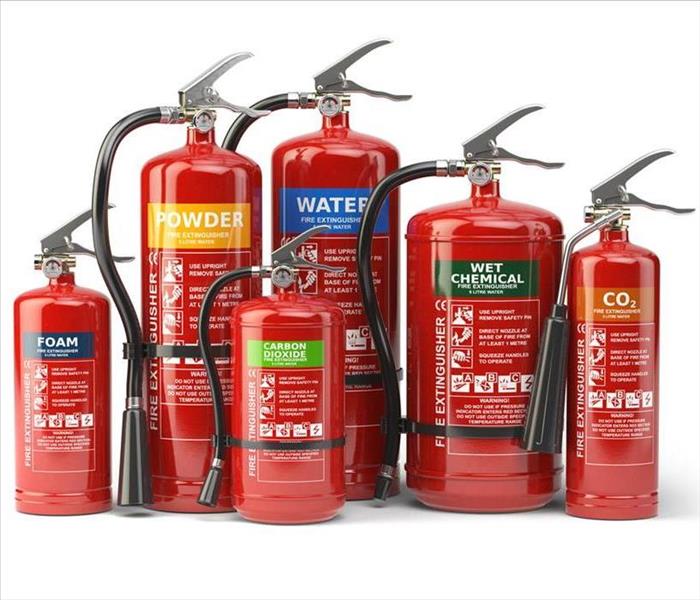 Having at least one fire extinguisher in your home is a great safety practice.
Having at least one fire extinguisher in your home is a great safety practice.
How To Choose the Right Extinguisher
Having a fire extinguisher in your Dahlonega, GA, home can help you stop a house fire from becoming a disaster. To best protect your home, you need to buy the right extinguisher for the space. You can turn to a residential fire damage professional and this guide to help you choose the best product for your needs.
1. Where Will It Be Used?
Are you going to put the extinguisher in your garage, kitchen or laundry room? Believe it or not, the location of your extinguisher should actually dictate what product you buy. In the garage, for example, you may want a larger model because the home fire may grow before you notice it in this space. On the other hand, you may be able to use a smaller model in the kitchen where you'll typically spot fires before they grow out of hand.
2. What Kind of Flames Will It Fight?
Did you know that a fire extinguisher may be designed to fight a certain kind of flame? This safety equipment often comes labeled as A, B, or C. The A category works well against common combustibles, including cloth, wood, and paper. B extinguishers are often designed to tackle fires caused by cooking oils, gasoline, or other liquids. The C products may help with electric fires. As you purchase your tool, you need to think about the kind of fires that may take place in the room you want to keep it in.
3. How Easy Is It To Use?
Will anyone be able to use the extinguisher? A big part of fire preparedness is making sure everyone in your home can tackle an emergency situation. Purchasing an extinguisher that has an easy-to-use hose may make it easier for anyone in your family to dampen flames. It may be a good idea for you to include a how-to demonstration during your next family fire drill.
Having at least one fire extinguisher in your home is a great safety practice. Getting the best product for your space can increase the safety tool's usefulness.
What Causes Sewers To Back Up After a Storm?
11/10/2021 (Permalink)
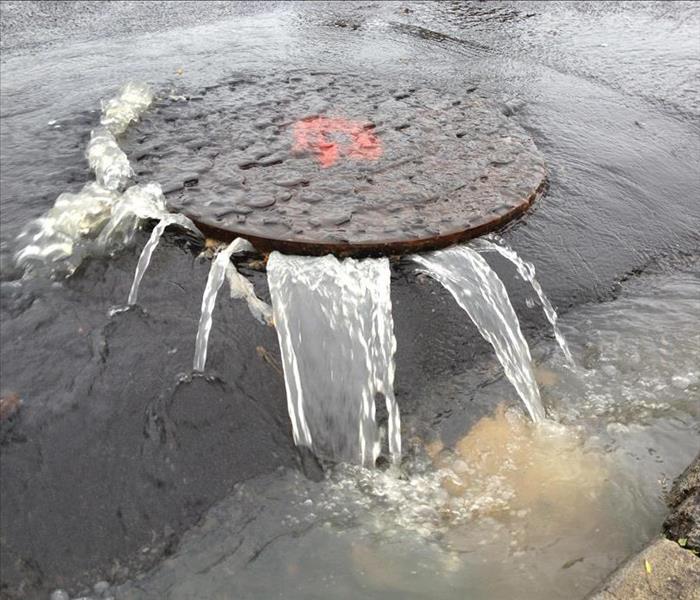 Heavy rain can cause municipal sewer systems to become back up.
Heavy rain can cause municipal sewer systems to become back up.
Why Rain Water Can Lead To a Sewer Backup
Municipal sewer systems can become overwhelmed and back up due to heavy rain. There are three common reasons why excessive rain water can lead to a sewer backup.
1. Increased Development
A storm sewer system that serves a municipality that has experienced a lot of rapid development may not be able to keep up with increased runoff levels. This can cause storm water to back up into the drains of commercial properties and homes in the region. Commercial property owners may want to consider an insurance endorsement or preventative plumbing solutions for frequent backups.
2. Poor Sewer Maintenance
The city also may not be doing a sufficient amount of sewer maintenance. Unfortunately, even if the municipality is to blame for a sewer backup, it is probably not liable for the cost of removing black water and restoring commercial property damage. Sewer backups are also commonly excluded from commercial property insurance policies. You may want to add a sewage damage endorsement to a policy to cover mitigation and restoration costs.
3. Lack of Dedicated Storm Sewers
If a municipality does not have enough storm sewers, flooding and backups may happen every time it rains heavily. If this is the case, a commercial property owner may want to consider having a basement drain raised and an ejector pump installed or having a sewer backwater device such as a check valve or gate valve installed. Keep in mind that waste and storm drainage cannot flow through while this valve is closed, which may make it less desirable for installation in large commercial buildings.
If you own commercial property in a region that frequently experiences sewer backups due to rainwater, the best option may be an endorsement on a business property insurance policy. This coverage can help to offset the cost of professional cleaning and restoration after a sewer backup in Jasper, GA.
How Big Is Too Big: When To Call a Mold Remediation Specialist
10/27/2021 (Permalink)
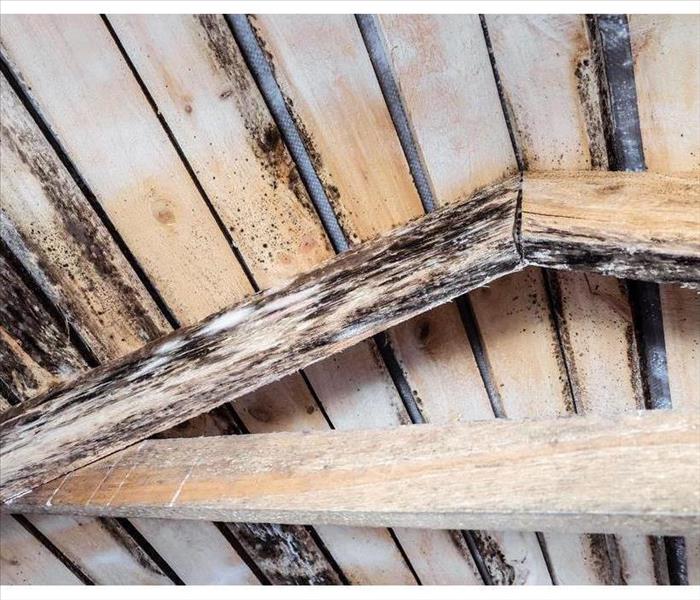 Mold growth in a Dawsonville, GA home.
Mold growth in a Dawsonville, GA home.
When To Call a Mold Remediation Specialist
A dank or musty smell in your home in Dawsonville, GA, could be a sign of mold growth problem. How big that problem is determining who should be involved in getting rid of it. While you can probably handle very small mold issues on your own, it is better to leave most house mold remediation to the professionals.
What You Can Handle
If you see a small patch of mold growing on a dirty plate in the kitchen sink, you are probably not going to hire someone to take care of it. You can’t just wipe it off or cover it up, though. For very small mold problems such as this, you can likely handle them yourself with the proper precautions:
- Don the appropriate protective clothing, covering your hands, eyes, mouth, and nose.
- Clean with detergent and rinse completely.
- Dry items thoroughly before storing them.
Prevention is the best solution of all. You can help prevent mold by cleaning regularly and maintaining proper ventilation and airflow to all areas of your home.
What the Experts Can Do
If your house mold is a bigger problem, however, professional help is necessary. A prolonged leak can cause extensive water damage, which is a breeding ground for mold growth. If the water that caused the damage was contaminated, additional steps might be required to fix the problem. Mold in your air ducts or other parts of your home’s HVAC system requires an expert’s attention. If you suspect that mold has gotten inside your walls or under your flooring, you need certified technicians to test the area and resolve the issue.
Failure to address a house mold problem in the appropriate way only makes it worse. Unless the growth is tiny, taking care of it most likely requires the work of professional mold remediation specialists. Resolve your mold issue completely by calling in professionals when necessary.
Understanding Commercial Property Insurance Coverage
10/27/2021 (Permalink)
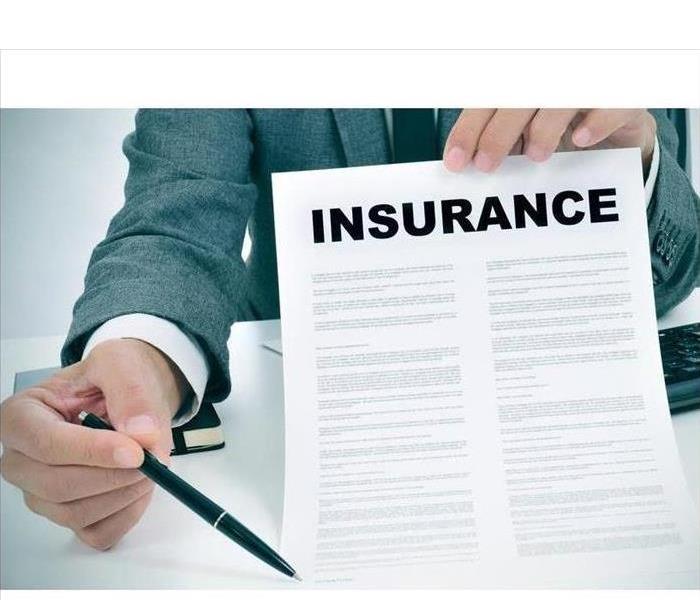 What’s covered under commercial insurance depends on the package you choose.
What’s covered under commercial insurance depends on the package you choose.
Commercial Property Insurance
Commercial property insurance can be a highly complex topic that some business owners struggle with. What’s covered? What isn’t covered? What affects the costs of your premiums by driving them up or driving them down? Let’s take a look at what commercial property insurance looks like for property owners in Jasper, GA.
What’s Covered Under Commercial Property Insurance
Many times, what’s covered under commercial insurance depends on the package you choose. You may choose a bare minimum package that only covers liability for any damages not of your own making, or you may choose a more extensive package. Some things you can cover with commercial property insurance include:
• Structural damage caused by fire, accident, or natural disaster
• Theft of property or inventory
• Damage caused by trespassers or vandalism
• Fire, flood, or accident damage to equipment, furnishings, and inventory
• Personal injury liability on premises
What Brings Your Premiums Up
Multiple factors may impact why a commercial insurance provider would raise premiums on your building. If you live in an older building with a high risk of fire, for example, you may pay more for insurance. Your industry also matters; a restaurant has a much higher chance of fire than a daycare center. Neighborhood and proximity to fire services and police services can also play a role.
What Drives Your Premiums Down
That said, commercial insurance providers can also help you find ways to bring your premiums down. Just installing a security system can be enough to bring your premiums down by reducing your likelihood of theft or unwanted intrusion. If your building is constructed from newer fire-retardant materials, you may also see a drop in premiums.
The location once again has an impact, and the closer you are to fire and police services the lower your premium can be. Lastly, if your business is in a low-risk industry that doesn’t frequently have hazardous materials or situations on the property, you can hope to enjoy lower premiums.
Everything You Need To Know About Drain Cleaners
10/13/2021 (Permalink)
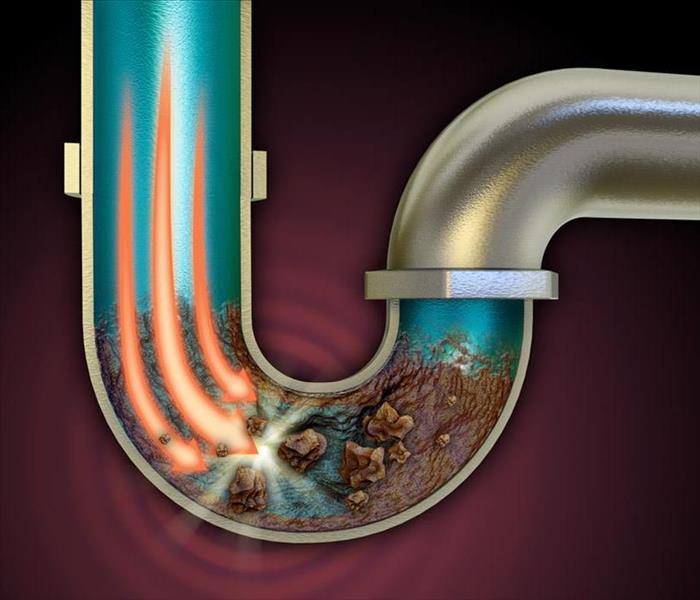 Drain cleaners have some properties that can damage your pipes.
Drain cleaners have some properties that can damage your pipes.
When you are dealing with a clogged drain at home, it may sound tempting to just pour a chemical cleaner to eliminate the problem. However, this is not always the right solution. Drain cleaner has some properties that can damage your pipes and wreak havoc on your home in Cumming, GA. Educate yourself about this type of cleaner to use it appropriately.
The Basics of Chemical Cleaners
Liquid cleaners used in sewage cleaning can be either oxidizing, caustic or acid. No matter the type of chemicals, they create heat that dissolves organic blockage such as food, hair, or grease. Specifically, the cleaner triggers an electron transfer that either adds to or removes electrons from the organic matter. The heat generated by this exchange then weakens the clog, making it easier to flush away.
Potential Damage and Consequences
Despite the convenience of these cleaners, they are not ideal for every clogged drain case. There are specific situations where they can damage the pipes.
- Plastic pipes
- Older and weaker metal pipes
- Complete drain blockage
The strong chemicals can diminish the pipes, leading to extensive water damage that only an emergency remediation service can fix. They also have secondary effects on both your health and the environment. Prevent these consequences by limiting use to partial blockage made of organic materials and only as a last resort when alternatives fail.
Alternatives to Cleaners
There are a couple of solutions to try before deploying a drain cleaner. First, you can go the mechanical route by using tools to manually unclog the drain. Augers and plunges are the most common devices for this method. If it does not work, try enzymatic cleaners. These products contain enzymes, or bacteria, that break down the clog. They usually take a day to unblock the pipe, but they are a safer option.
While chemical cleaners are a fast solution for a clogged drain, they are not always effective and should be used when out of options. Ensure your situation meets the right criteria before using this agent.
Your Guide to Roof Repair After Hail and Heavy Winds Damage Your Shingles
9/19/2021 (Permalink)
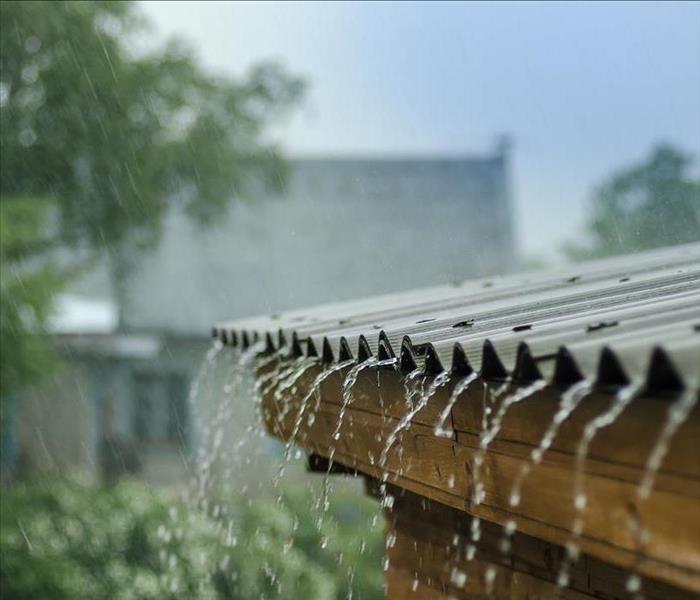 If your home has extensive roof damage because of hail and heavy winds, request a quality inspection before investing in roof repair.
If your home has extensive roof damage because of hail and heavy winds, request a quality inspection before investing in roof repair.
Everyone loves a good end-of-summer storm, but when the nights grow cooler and the winds grow stronger, those nice summer storms turn into damaging tempests. Hail, heavy winds, and torrential rains may be exciting to watch from within, but they're harmful to a home's structure. If your roof was recently the victim of hail and wind damage, you may be able to get away with a small roof repair—or you may be forced to invest in roof replacement.
A quality inspection can give you an indication of which you will need:
• Have your roof tested to determine its existing condition and life expectancy.
• Have a moisture survey of your roof done.
• Let a professional roofer assess the extent of the damage—is it just a patch or it is the entire roof?
• Request a weather impact condition report to see if your roof was even subject to the hail.
When searching for a roofing company, make sure that it offers each of the above services.
A Quality Inspection Is Key
Roof repair goes beyond patching a damaged area and calling it a day. If you want to ensure that your roof lasts for years into the future, and if you want to preserve the structural integrity of your home, you need to make sure that the company you hire actually fixes the issue and doesn't just cover it.
Each of the tests listed above is performed to measure the reliability of your roof's remaining materials. The last thing you want to do is pay thousands of dollars to have your roof re-shingled only to discover that the core of the roof damage lies along the deck. If that were to happen, you would be forced to remove the shingles you paid thousands of dollars to have installed, rip up the deck, reinstall a new deck and reinstall the shingles—a process which would cost you an additional good sum of money.
If your home has extensive roof damage because of hail and heavy winds, request a quality inspection before investing in roof repair. Talk to your Forsyth, GA, storm damage restoration team about the importance of a quality inspection.
Be Proactive to Avoid Flood Damage
9/14/2021 (Permalink)
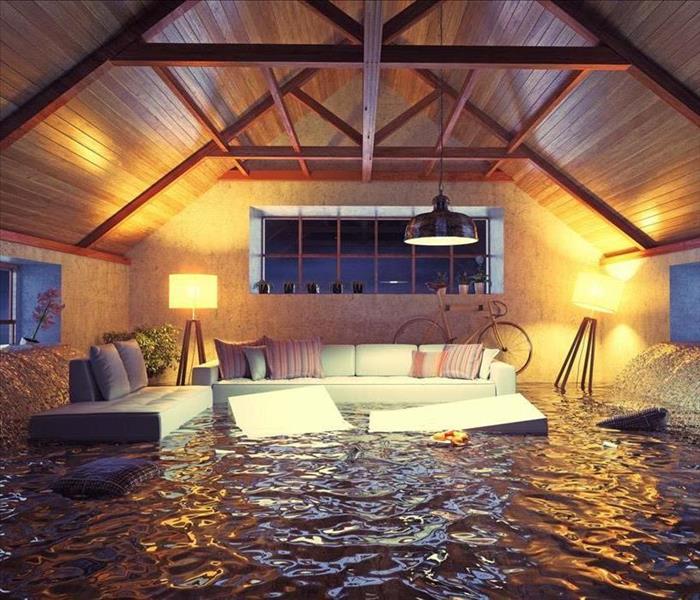 Dealing with flood damage can be a costly and time-consuming situation.
Dealing with flood damage can be a costly and time-consuming situation.
For businesses in Marble Hill, GA, it is more a matter of when not if flooding will happen. While it may not be possible to protect structures from flood damage, taking a proactive approach can help minimize losses and make dealing with the aftermath a little smoother.
Ways to Minimize Damage
Storm damage means trying to keep unwanted water from entering the building. Unfortunately, water can be tricky and find its way in through various means. Before the next storm starts brewing, consider the following to reinforce known areas of saturation:
- Keep drains and ditches free of leaves, mulch, and debris. If there is a storm drain nearby, ensure it is not blocked. Regularly clear debris from drains and ditches.
- Downspouts and gutters can easily get clogged, which means improper drainage onto the foundation. Regularly check them and keep them clean.
- Improper grading can lead to water accumulating around the foundation. Ensure the ground slopes away from it. Additional dirt or sod may be needed to get the right grading.
- The foundation itself can eventually have seal issues or small cracks. A regular foundation inspection makes it easier to find those small issues before they become a big one.
- If located in an area prone to floods, keep sandbags stored on the property that can be used to block rising waters.
Consider a Few Upgrades
If your business has experienced flood damage, you don’t have to deal with the cleanup alone. A water damage and restoration expert can help get your business back to “Like it never even happened.” Once your business is returned to normal, it may be worth considering adding a few upgrades to avoid a repeat. Flood skirts and barriers can be attached to windows and doors. There are also a number of flood detection systems on the market, including smart devices, that feature sensor and alarms when water is detected.
Dealing with flood damage can be a costly and time-consuming situation. Although it may not be possible to entirely avoid, staying ahead of the game by being prepared can make a big difference.
Understanding Secondary Water Damage
9/7/2021 (Permalink)
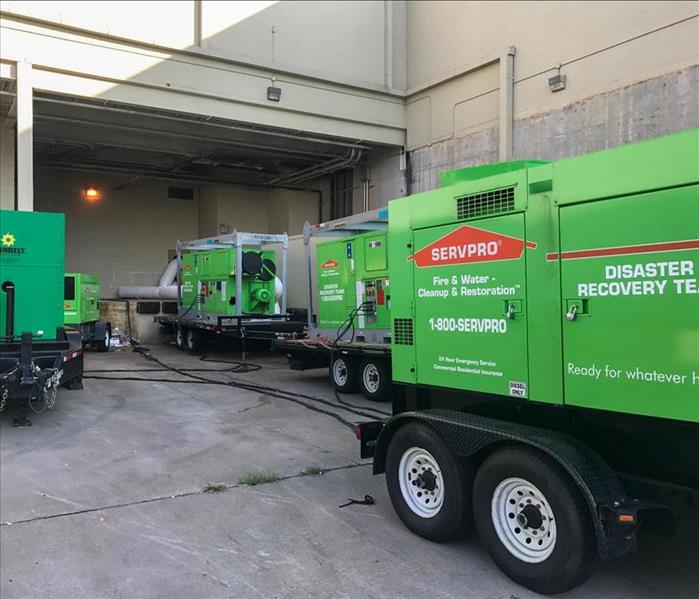 The best prevention of secondary water damage in your commercial property is responding quickly when you notice there is a problem.
The best prevention of secondary water damage in your commercial property is responding quickly when you notice there is a problem.
When you have a leaky pipe in your building in Forsyth, GA, it is in your best interest to get it fixed as soon as possible. Not only does it save you money on your utility bill, it also helps you prevent secondary water damage. Secondary damage can manifest as aesthetic problems, structural issues or black mold. It can increase the cost of your insurance claim and, as it is mostly preventable, may not even be covered by your commercial property policy.
Causes of Residual Damage
Secondary damage includes issues that are indirect consequences of a water problem. There are many reasons why this residual damage may occur:
• Lack of timely reporting to water mitigation experts
• Hidden issue undiscovered until the damage had already happened
• Improper or incomplete repair procedures
• Failure to reduce the high humidity in the building
• Problem more extensive than technicians could handle in a timely manner
Any of these situations can result in secondary water damage. Until the problem is remedied, more damage can continue to pile on.
Types of Secondary Damage
Problems such as black mold most often occur because the excess water has no place to go. It starts to evaporate the longer it sits, significantly increasing the moisture in the air and on surfaces. This is the perfect setup for mold growth. The high humidity can also affect sheetrock, drywall, and plaster, causing them to become waterlogged and sag. Flooring is affected, too, as the water loosens tiles, dissolves the adhesive that holds vinyl to the floor, and makes hardwood floors swell and buckle. The longer the area remains humid, the worse the damage is likely to get.
The best prevention of secondary water damage in your commercial property is responding quickly when you notice there is a problem. Even if you don't think the problem is that big of a deal, contact mitigation experts to cover your bases. It's better to hear that you don't need their services than to find out later that you should have called.
Cleaning Out Your Closet… And Pantry… And Basement… And: What Can You Salvage After a Flood?
9/2/2021 (Permalink)
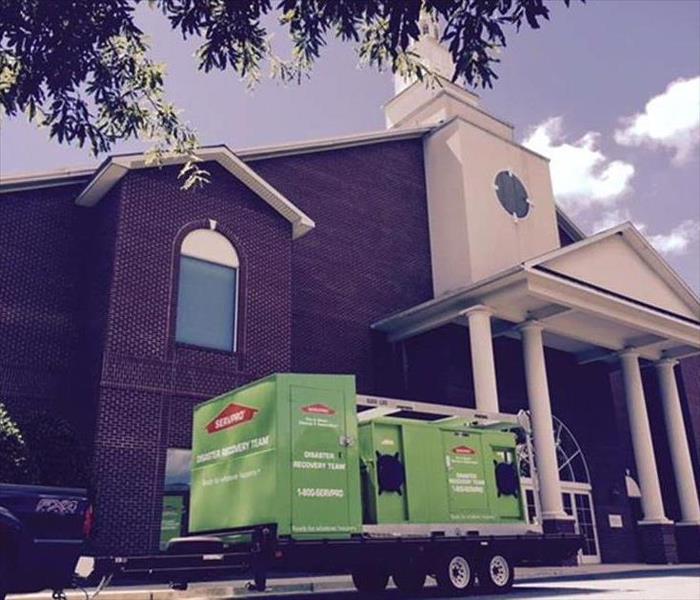 Content cleaning can be an exhausting process because it stresses you not only physically but emotionally.
Content cleaning can be an exhausting process because it stresses you not only physically but emotionally.
A flood has hit you, and now the long process of content cleaning begins. While you will likely want to keep everything and salvage as many memories as possible, the unfortunate reality is that flooding causes black water, which is toxic for both humans and pets. This does not mean that everything must go, but it does mean that you may have to part with some things that hold significant intrinsic value.
1. Nonporous Materials Can Likely Be Saved
As nonporous materials are things that cannot be penetrated by the water, these types of items can typically be salvaged. Some examples of nonporous materials are solid plastics, ceramics, metal, and glass, meaning that most dishes and even jewelry can be saved; however, all will have to be extensively disinfected.
2. Porous Materials Likely Can’t Be Saved
Unfortunately, as porous materials can easily be penetrated, these types of items likely can’t be saved. Some examples of porous materials are paper, wood, carpeting, drywall, insulation, and laminate, meaning that any photographs, draperies, flooring, and drywall that have been exposed to water should be removed because no amount of content cleaning will eliminate all the contaminants.
3. Seek Assistance from Professionals
It is understandable to be overwhelmed in this process. Flooding is invasive and destructive by definition, and no amount of preparation can prepare you for the emotional turmoil of a damaged home. Fortunately, you don’t have to make the decisions of what’s salvageable and not on your own because there are likely several restoration specialists in Forsyth, GA, who have the expertise to make that decision for you.
Content cleaning can be an exhausting process because it stresses you not only physically but emotionally; however, if you can go at the cleanup process systematically dividing items between porous and nonporous materials, you may find the process a little easier.
Mold 101
7/26/2021 (Permalink)
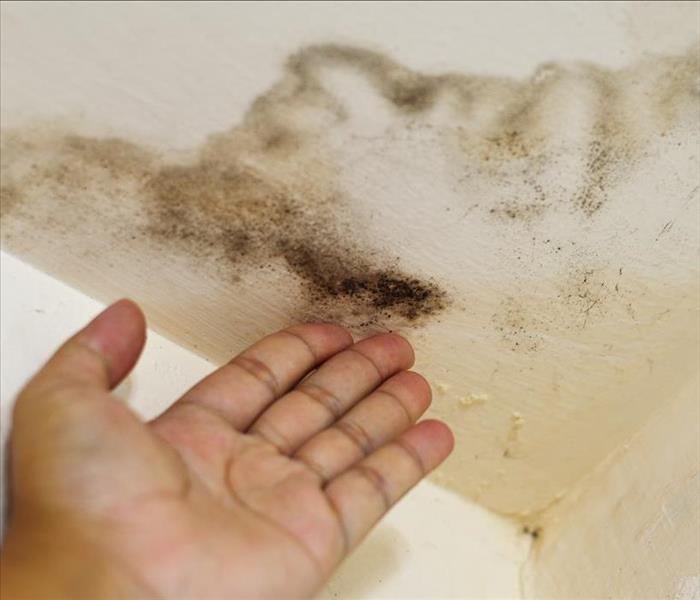 Mold should not take up residence in your building.
Mold should not take up residence in your building.
Types of Molds and How To Identify Them
In short, mold is a fungus that helps to decompose dead plants and animals by breaking down carbon material. Mold spreads through the air via spores that attach themselves to any source of food. Their spores can also grow indoors. One of the most infamous is Stachybotrys, also commonly known as “black mold.” However, this is not the only mold that can find its way into buildings. Although the exact number of species is still unknown, scientists estimate that there are thousands. Many can affect your business in Talking Rock, GA. Here are some of the most common kinds and how to identify them.
1. Aspergillus
Aspergillus is frequently found wherever dust accumulates. It typically has a brown or dark-green color. Different places this mold can spread are floors, wallpapers and air filters. Certain species are also found on food.
2. Stachybotrys
Stachybotrys earned its nickname, black mold, through its distinctive greenish-black gel-like appearance. Like many fungi, it can spread in any area with a moisture problem. That is why it is frequently found in restrooms or on walls in rooms that have experienced flooding. While some species may not pose a large threat to public safety, you can check with a reputable mold cleanup service to inspect your property in order to identify whether professional removal is necessary.
3. Cladosporium
Cladosporium can also spread in areas of high moisture. Colonies can grow in bathrooms, in basements and on any wood surface. Typically, you can spot this type of mold by its green or brown color. While it is possible to remove this type of mold yourself, calling qualified mold experts can assist in its disposal.
In nature, mold serves a natural purpose in the ecosystem. However, mold, especially black mold, should not take up residence in your building. Learning how to identify mold and who to call when you face an infestation will help you safeguard your business’s future.
Choosing the Right Smoke Alarm in 3 Steps
7/23/2021 (Permalink)
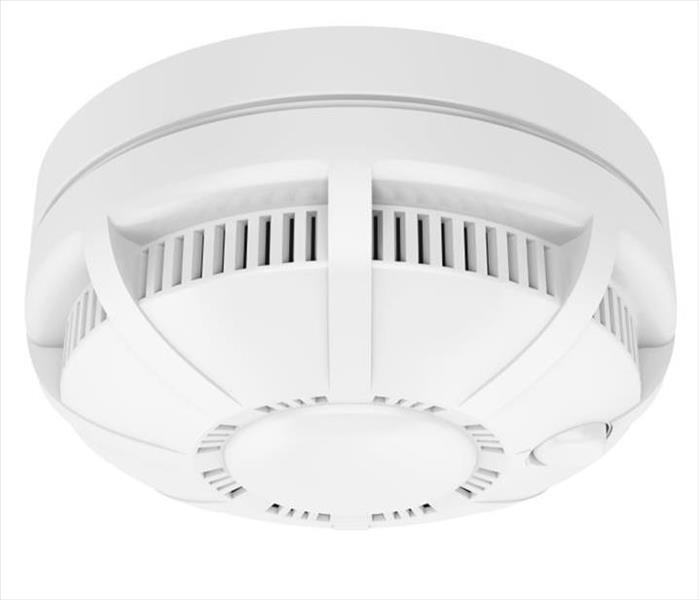 Testing the smoke detector should be done once a month.
Testing the smoke detector should be done once a month.
3 Steps To Choosing The Best Smoke Alarm
Alerting your residence of a fire in Cumming, GA requires the appropriate type of protection. To make sure your home stays safe, here are three steps to choose a smoke alarm that’s perfect for your needs.
1. Understand the 3 Types of Residential Fire Alarms
Ionization alarms use an electric current to quickly pick up fast flame fires such as kitchen fires or burning light furniture. They are, however, prone to nuisance tripping from shower steam or burnt food.
Alarms that use a strobe light for better detection of smoldering fires are photoelectric. They are less prone to going off from minor fires and are better at alerting to dangerous slow burning fires of heavy furniture and building materials.
Combing the two, dual-sensor alarms offer detection of both fast flame and smoldering blazes. While they may false alarm because of the ionization component, they are the most comprehensive coverage.
2. Decide Which Type Fits Based on Your Home Design
The number of detectors necessary for fire safety depends on the size of your home. A centralized system is recommended since noise may not carry throughout the home from a single unit to appropriately alert everyone.
A smoke alarm should be put in every room and outside each door to establish coverage of the entire premise. To prevent nuisance tripping, it’s worth considering using a photoelectric alarm around the kitchen or outside of bathrooms.
3. Evaluate the Unit Before Buying
Reading through any relevant information, you should familiarize yourself with proper maintenance of the unit before buying to make sure it’s reasonable to maintain.
Testing the smoke detector is a monthly procedure, so consideration should be made towards features that simplify the process to ensure it gets done. Additionally, you should learn how to silence the device without disabling it to always have continuous protection.
A smoke alarm can only do so much. A fire damage restoration company reverses damage and repairs burnt parts of your home. Choosing the right alarm types for your home allows you to act sooner to prevent more damage while increasing the likelihood of successful restoration.
Is All Flood Water Dirty?
6/25/2021 (Permalink)
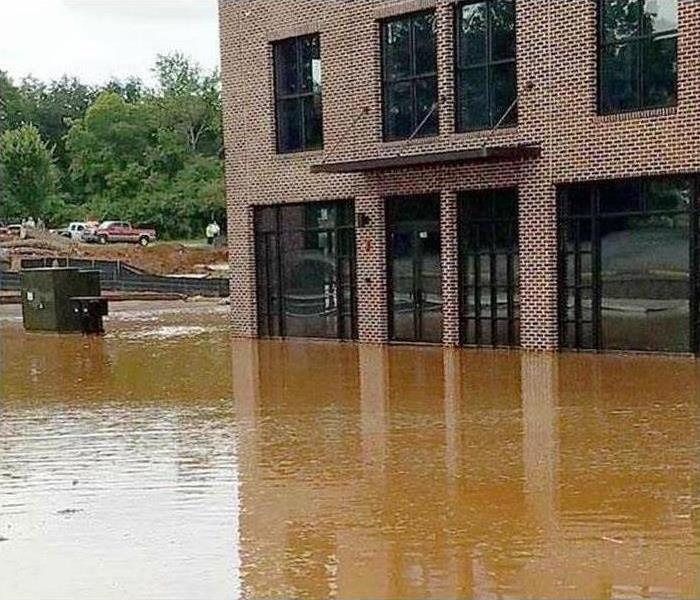 Floods can happen quickly.
Floods can happen quickly.
Why Are Floodwaters Dirty?
If you have dealt with any sort of flooding in your Dawsonville, GA, home, you may have heard the water damage cleanup crew talking about dirty water. Typically, the waters that fill a home fall into one of three categories:
As a homeowner, it can be beneficial for you to have some understanding of these different types of floodwater. Learning what makes contaminated water contaminated can help you better assess emergency situations in your house.
Category One
The first category of floodwater is often called clean. If the flood source is a broken supply line or leaky shower head, chances are the water does not have any contaminants in it. While any water can do damage to your home, anything from a clean source is easier to clean up if addressed quickly because it does not already contain spores and bacteria.
Category Two
The second category is contaminated water. Some professionals may refer to it as gray water. Floods that fit under this description contain bacteria and viruses. Often, this flooding comes from some type of appliance overflow. The water that seeps out of your dishwasher hose, for example, may have some bacteria already in it.
Category Three
The third category is called black water. This is the most contaminated flooding that can affect your home. Sewage backup and outside water often fall into this category. This type may have feces, microbes and harsh chemicals in it.
Degradation
Even if your flood starts off as clean, you need to address the water buildup as quickly as possible. Even clean water can start to degrade. As the water from your supply line runs through your walls and into your basement, it may pick up bacteria that turns it into category two water.
3 Ways To Reduce the Likelihood of a Cigarette Fire in Your Home
6/25/2021 (Permalink)
 Smoke outdoors.
Smoke outdoors.
What Will Reduce The Chance Of A Fire From Smoking?
In the US alone, the average cigarette fire is responsible for over 1,000 deaths and 3,000 injuries each year, making up around 20 percent of total fire deaths annually. Therefore, if you’re a smoker in Dahlonega, GA, you may want to consider taking a few precautions while you indulge your habit. These are some of the most effective yet simple changes you could make:
- Going outdoors to smoke
- Keeping ashtrays away from the house
- Considering smokeless alternatives
1. Take It Outside
Cigarette fires typically gain their momentum when hot cinders come into contact with dry, flammable materials such as carpets, upholsteries and other household fabrics. The best way to avoid the fire cleanup efforts these can lead to is to smoke outdoors. It may not be as comfortable as an experience, but it certainly leads to fewer fires overall.
2. Position Ashtrays Properly
Not every cigarette fire starts as a carelessly discarded cinder. In fact, many start in ashtrays. When you flick your ashes into the tray, it’s important to remember that not all of them are dead. If a blaze comes back to life and it’s too near your home or other belongings, an ashtray fire could lead to a serious fire in a matter of minutes. Keep ashtrays away from your home’s siding while outdoors.
3. Try E-Cigs and Vapes
You can also combat the issue by using a number of cigarette alternatives, such as e-cigarettes and vapes. These are designed to give smokers the nicotine fix they crave while cutting out the harmful effects and odors of smoke and the risks that fire offers.
Don't put your home at risk. Taking any or all of these precautions can help to drastically reduce the chances of a cigarette fire occurring on your property, so you can enjoy your habit without worry.
Responsibilities of a Commercial Tenant During a Rental Flood
6/25/2021 (Permalink)
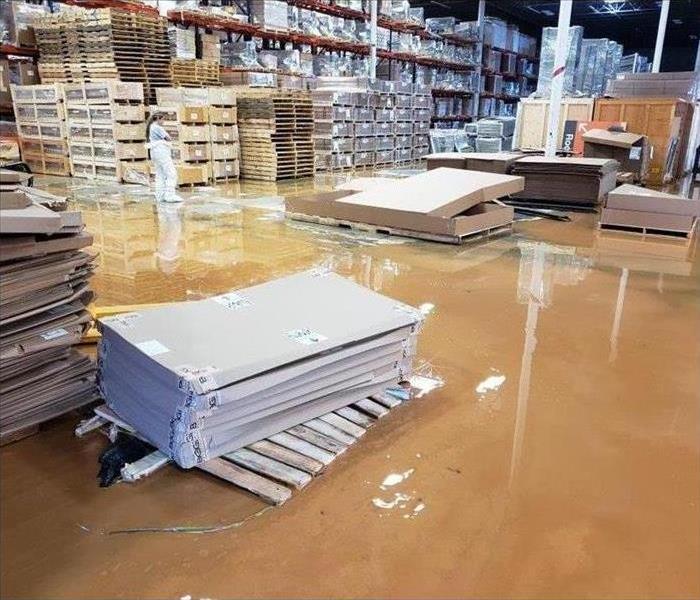 Flood damage in a Jasper, GA warehouse.
Flood damage in a Jasper, GA warehouse.
Responsibilities of a Commercial Tenant During a Rental Flood
When a flood hits your rented business property in Jasper, GA, you may be wondering who is liable for the damage. It may depend on the circumstances of local law and lease agreements, but it’s often like a residential lease. Knowing what coverage is offered to a tenant by renting and what’s covered by renter’s insurance teaches you your legal responsibilities if a flood happens.
Lease, Law, and Understanding
In a traditional lease, the process of addressing damage is often by a standard procedure:
- A tenant pays lower amounts to occupy a property while the owner handles any damages to the property that is explicitly not the tenant’s fault.
- If there is an unsafe condition or damaged part of the property caused by a flood or other event, the tenant has an obligation to write the landlord about it.
- The landlord has an obligation to repair any reported problems in a timely manner.
Depending on state law and the language of a commercial lease, all repairs may fall on the tenant. It is advised to consult the original lease to see any specified conditionals on flooding and other damage. Some states have laws or court rulings that establish the landlord’s responsibility regardless.
For Everything Not Covered, There’s Other Coverage
The landlord has no obligation to cover property inside the building. It is up to the commercial property’s occupant to obtain renter’s insurance to protect assets inside. As a standard, this insurance coverage offers protection against unintentional damage alongside vandalism and theft. Sometimes, flood damage is not included and offered as an additional service, but it is advised in regions prone to flooding.
Restoring the Building Once Coverage Is Figured Out
Renter’s insurance is used to restore and replace damaged business assets or the building. Restoration is typically accomplished by using a commercial damage restoration company. Working out the coverage with the property owner will speed the damage restoration process up to get your business’ location restored and functional quickly.
Yes, A Flood Cut Is Essential: Here Is What You Need To Know
6/14/2021 (Permalink)
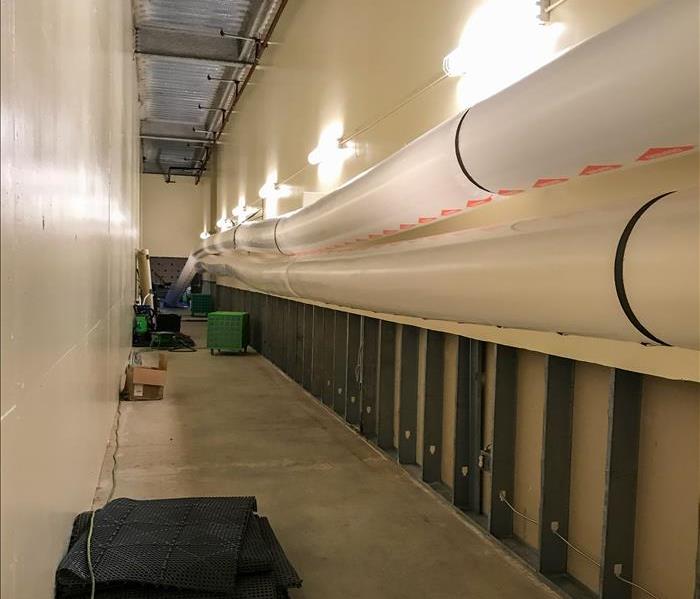 A flood cut is a tear-out within the drywall, at least 12 inches above the waterline.
A flood cut is a tear-out within the drywall, at least 12 inches above the waterline.
Are damp walls a serious concern? What impact does flooding have on your facility? Is cutting out the walls really needed? Commercial owners in Cumming, GA are likely to question the gravity of saturation, wondering about its hazardous nature and extensive cleanup procedures. Understand that floodwaters severely harm the structure; therefore, it's vital to perform drying methods and flood cuts.
What Is a Flood Cut?
Moisture quickly permeates porous materials; thus, as water pours into your building, drywall, flooring and objects readily absorb it. The soaked structure acts as a catalyst for harboring organisms, particularly fungus and bacteria. Within 24 hours, outbreaks can occur, spreading to the other rooms. To stop this act from happening, it's critical to eliminate the wetness.
A flood cut is a tear-out within the drywall, at least 12 inches above the waterline. Experts from a flood restoration company use moisture meters to determine the extent of the dampness. Often, more is drenched than the eye can see; therefore, technicians take excess to secure the premises. This tactic removes the water, cutting off the contaminant's catalyst.
Why Is It Effective?
Because flooding kicks off secondary damage, specialists should tend to the fluid buildup as efficiently as possible, mitigating further trouble. The flood cut opens up the wall space, permitting more air circulation and faster drying, particularly with studs and sills, which are hard to reach with industrial dehumidifiers alone. It's imperative to dry out the internal wall just as much as the outer zones.
How Soon Should It Be Completed?
Contamination occurs quickly, so this method works best when used within the first day or two. Delays only allow for more spread and require additional action.
If your establishment is impacted by flooding, seek professional help immediately. Expert care is essential to ensure that the area is dried completed. Flood cuts are a crucial tool for successful remediation.
Do You Have To Use a Certified Hygienist To Check Your Home for Mold?
6/14/2021 (Permalink)
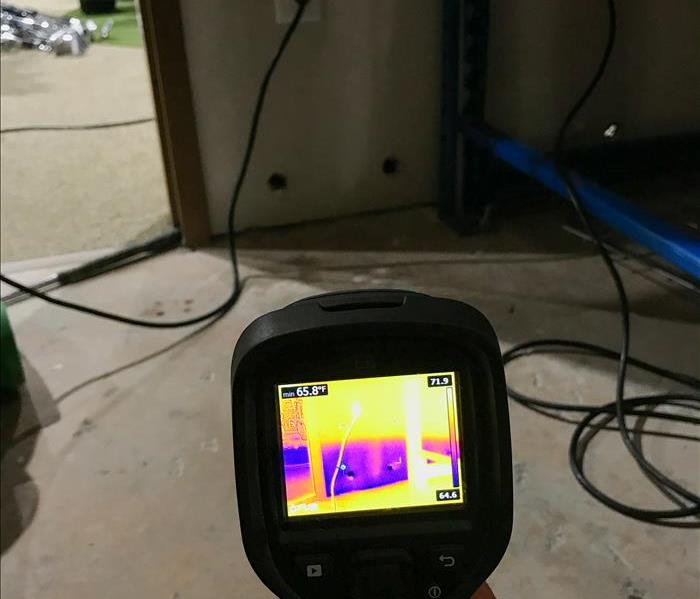 Mold inspection in Coal Mountain, GA.
Mold inspection in Coal Mountain, GA.
If black mold is growing in your home, you need to know as soon as possible. It can cause all kinds of problems, not the least of which includes damaging construction materials, ruining carpets and destroying fabrics. Mold cleaning is also a complicated subject, requiring a broad knowledge of possible causes and effective solutions.
Fortunately, the process has been standardized by the American Board of Industrial Hygiene. They not only certify inspectors but also provide rigorous examinations and require training before they issue certificates in testing and mold remediation. This ensures a high degree of professionalism and is your way to be sure you’ll get your mold problem identified and corrected.
What Is the ABIH?
Since 1960, they’ve been providing training and examinations for certified industrial hygienists. This includes:
- Maintaining certification
- Ongoing education
- Adhering to high ethical standards
They require a huge breadth of knowledge, including toxicology, biology and specialized equipment use. They also must demonstrate knowledge about the most modern mold remediation methods.
Is Certification Required?
It depends on your circumstances. Coal Mountain has building codes and if mold is causing structural damage, it certainly will need to be corrected. However, different strains of mold react quite differently to the various methods, so effective mold cleaning means having detailed knowledge about what works best.
If insurance is paying for the mold cleanup, they’ll probably require you to use a certified mold damage restoration expert for testing and remediation. Mold testing can easily give false positives as well as negatives, and the insurers want to be sure the mold is really a problem before paying for the cleaning.
What if Your Mold Test Is Positive?
If your mold testing company is certified, they can also complete the entire mold restoration process as well. This includes finding the source of the excess moisture that’s needed for mold growth as well as returning the area to its previous condition.
Mold cleaning is easy when left to the professionals. If you use a certified mold testing company, you can be sure about the results and get the cleanup done quickly and at a reasonable cost.
3 Ways To Save Your Belongings After a Fire
4/19/2021 (Permalink)
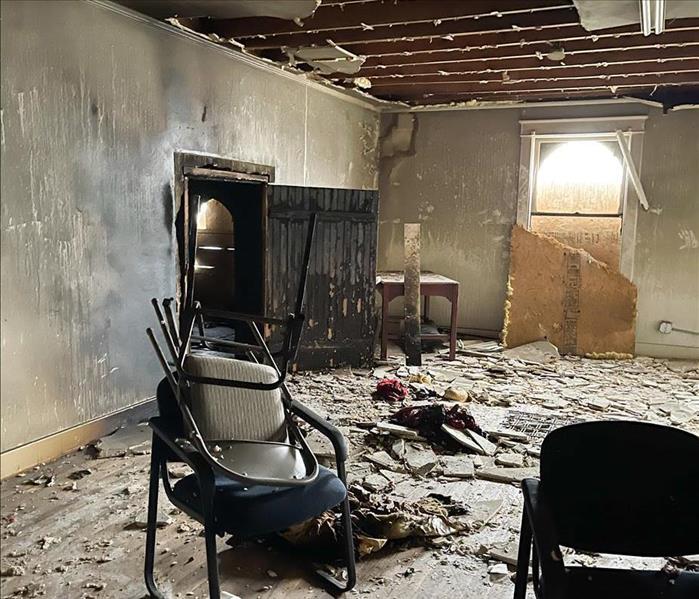 Fire damage in Cumming, GA.
Fire damage in Cumming, GA.
How To Proceed In The Wake Of A Fire
Experiencing a structural fire is undoubtedly a nightmare realized. Not only is the affected building potentially destroyed, but your belongings inside appear to be beyond restoration. If your personal possessions are affected by smoke damage, there is hope for recovery.
1. Determine What Is Restorable
Ideally, restore the majority of your possessions harmed in the fire versus replacing them. Family heirlooms and irreplaceable keepsakes specifically should be carefully treated to avoid total ruin. Several techniques exist to combat smoke damage and smoke odor:
- Dry and Wet Cleaning
- Spray and Wipe
- Foam Cleaning
- Abrasive and Immersion Cleaning
Depending on the damage, many or all of these smoke cleaning methods can assist in the restoration process.
2. Prepare To Move Out
Often, a structure in Cumming, GA, remains unlivable until the extent of necessary smoke cleaning is complete. In this case, companies exist to assist you in a temporary relocation during your home's refurbishment.
Not only is it unsafe to live in a house laden with smoke odor, but it is much easier for the professionals to complete the fire restoration process without working around other individuals and their schedules.
Once the cleaning is complete, the same company can help you move back into your clean, safe home. This assistance provides comfort and ease in a time of crisis and trauma.
3. Beware Of Electronics
Fire presents a host of dangers where your electronics are concerned. As such, never attempt to plug in or operate any of your appliances following a fire. Always contact an electrician to inspect your wiring, outlets, and electronics before activating them post-fire. If necessary, a professional can accurately and safely clean any remaining smoke residue, allowing you safe use of your personal devices.
While damaging and frightful, fires do not always cause ruin beyond repair. By following the correct smoke cleaning steps, your belongings can survive even the most dangerous of blazes.
How To Get That Weird Smell Out of Your Microwave
3/30/2021 (Permalink)
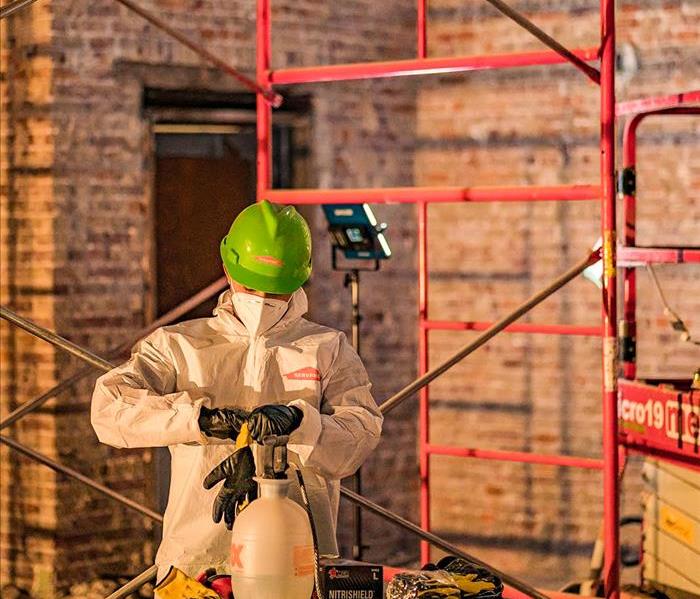 Microwave maintenance is an important element of fire safety.
Microwave maintenance is an important element of fire safety.
Smoke Removal From Your Microwave
You know how it goes: There was that one time you popped popcorn, got a little distracted, left it running a little too long... and now your microwave has that distinct burnt popcorn smell that loves to linger. It's time to give it a good deep clean. If you want to know how to get that smoke smell or any other weird smell out of your microwave, follow these three steps.
1. Interior
Start with the interior using the vinegar method: Essentially, you want to mix 2 tablespoons of vinegar with 2 cups of warm water in a microwave-safe bowl. Heat on high until boiling, and then let it sit for a few minutes so that the steam can loosen up any grime inside. This will make it much easier to then wipe out the entire inside of the unit.
2. Exterior
You can also use a vinegar-and-water mixture to wipe down the door and exterior parts of the unit. Tackle the gaskets and little pieces along with the door as well. Use an old toothbrush to help you get into the nooks and crannies. Try to remove all food splatters that could be retaining that smoke smell.
3. Vent and Filters
Don't forget about the vent grill, where oil and buildup can stay trapped, keeping that smoke smell in with it. With some styles, you can remove the vent in order to better clean it. Use a degreaser to loosen stuck-on oil so that it wipes off easily. Check for filters as well. These can be soaked in hot, soapy water or, depending on manufacturer specifications, run through the dishwasher.
Maintaining your microwave won't just help it smell better; it is an important element of fire safety too. Tackling the weird smells is a whole lot easier than handling fire cleanup in Coal Mountain, GA for which you'd definitely want professional help. It's worth it to put in a little elbow grease now.
Flooding Versus Storm Damage: 3 Differences
3/30/2021 (Permalink)
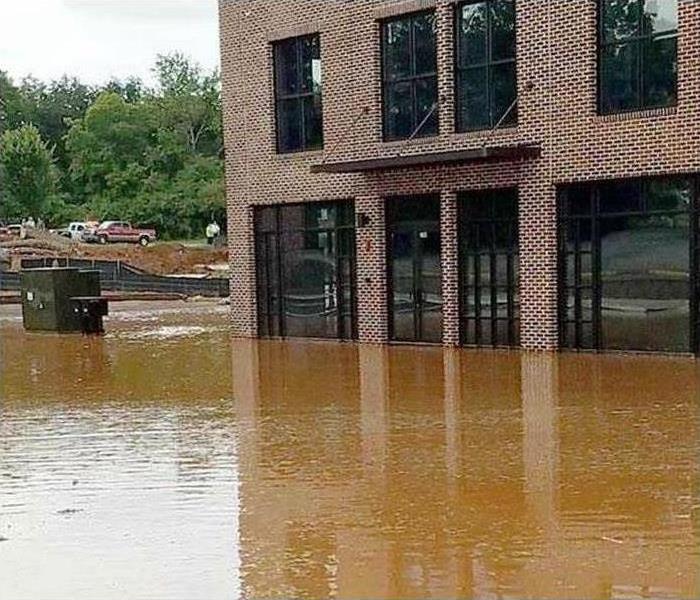 Flooded building in Cumming, GA.
Flooded building in Cumming, GA.
How Do Storm And Flooding Impact My Business
When you own a Cumming, GA business, the risk of storm and flooding damage may be high on your list of worries, especially when certain times of the year are known for violent weather. Storms may produce flooding, high winds and power outages; however, there are several differences between flood damage and other types of issues that result from storms, and understanding each may help you recover more quickly afterward.
1. Floods Contain Black Water
When flooding occurs at your business due to storms, the resulting influx of water is likely to come from a contaminated source, such as an overflowing creek or sewer. As a result, the porous building materials inside your business, such as drywall, may absorb this dirty water and cause stains and an unpleasant odor. You may have to replace such items.
2. Storm Damage Is More Varied
When storm damage occurs, it may be more varied and extended than flooding. High winds can break windows, tear away building materials and cause damage to your property's roof. When these types of problems occur, your storm repair and restoration service may have to spend more time ensuring all types of damage are repaired before you can reopen your business.
3. Insurance Differences
Some insurance companies define flood damage differently than that caused by storms, especially when the flooding came from an internal source, such as a broken pipe. Flooding caused by heavy rains may be covered under your policy; however, it is best to contact your local insurance representative and send photos of the damage before attempting to open a claim. You can protect damaged areas of your building by blocking broken windows with wood planks and using tarps to prevent rainwater from entering a damaged roof.
Flood damage and storms can severely affect your business in a variety of ways. Understanding how each might impact your bottom line may help you put you on the path to reopening more quickly and reducing downtime for your employees.
What To Do When Sewage Water Contaminates Your Home
3/9/2021 (Permalink)
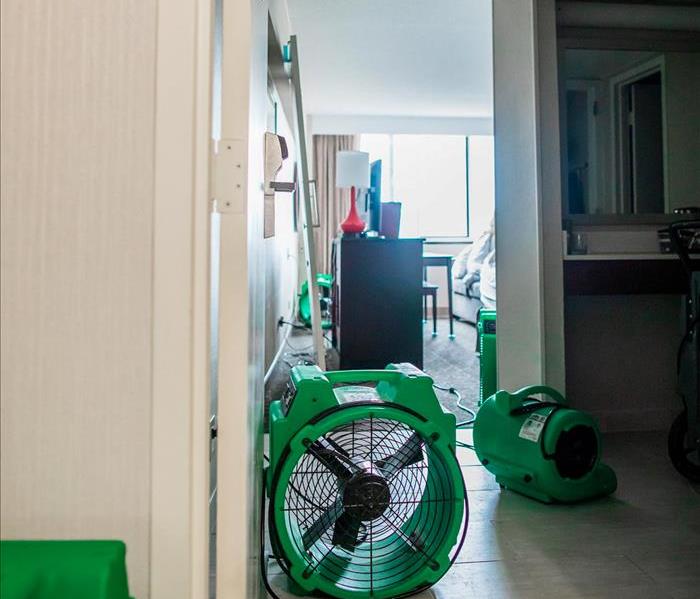 Be sure to call a professional to clean up any sewage
Be sure to call a professional to clean up any sewage
Sewer cleanup is not simple. The water is quite dirty and can create several concerns for the home's structure; therefore, when wastewater invades a house's space, it's best to act quickly, working with professionals to understand the cause and begin proper cleanup measures. Be aware of the answers to the following three questions.
How Does Sewer Water Get Into the Home?
A sewer backup may occur from several factors. Tree roots may grow into the exterior pipes, breaching them and blocking the flow. Toilet lines clog when large or harder substances go down the tubes and cannot leave the system. During intense storms, overflows may displace fluid. No matter the cause, the effect is the water cannot correctly exit; thus, it flows into the home through the closest portal (often the commode).
How Should You Handle Sewer Contamination?
Sewer cleanup requires meticulous and prompt attention. The dirty liquid quickly contaminates the space. Focus on two things: dry out everything and sanitize as best as possible. The following steps should be completed:
What Should Be Replaced?
A flooded toilet from a backup issue delivers category three water into the home. This fluid contains high levels of waste and bacteria. As it spills onto the floor, it seeps into the materials and eventually reaches the walls. These porous materials are unlikely to be cleaned with traditional methods because they absorb so much. It’s best to toss these sponge-like items to ensure proper cleanup occurs.
Owners may choose to keep nonporous objects, but they should still be scrubbed with warm water and soap. Spray with antimicrobial spray.
For effective sewer cleanup, homeowners must carefully inspect everything for water infiltration. Lower moisture levels and get rid of contaminated belongings, then, call SERVPRO of Forsyth and Dawson Counties.
How To Recover Documents From a Flood
2/19/2021 (Permalink)
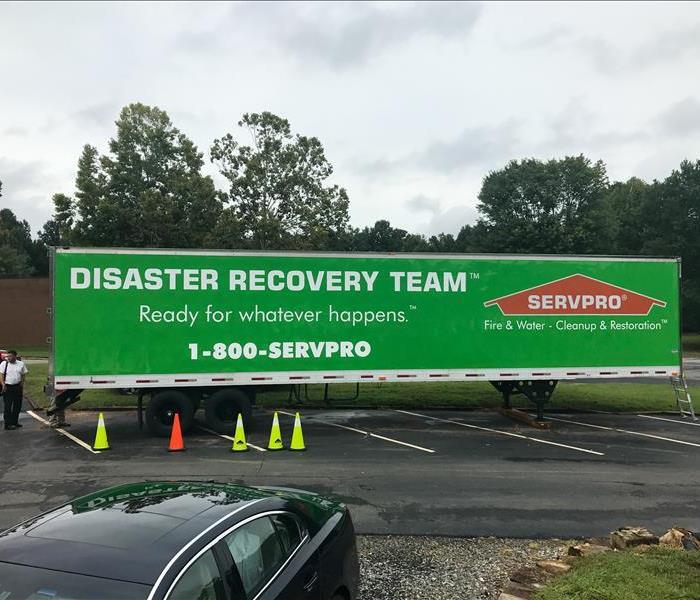 Document restoration is possible after a storm
Document restoration is possible after a storm
If your business in Cumming, GA experiences a flood, you may think that your documents are lost forever. Fortunately, document restoration is possible. SERVPRO can dry, sterilize and even digitize your damaged documents.
Document Types
At SERVPRO, our document damage restoration service can recover all kinds of documents:
- Photographs
- Papers
- Books
- Parchment
- Files
Their innovative methods of restoration can accommodate nearly all paper types. No matter what types of documents were effected, you should contact a professional as quickly as possible to minimize the damage.
Damage
Flooding can damage documents in several ways:
- Water damage
- Chemical exposure
- Contamination by bacteria or viruses
Document drying and sterilization can repair structural damage to the documents and remove any harmful substances.
Freeze Drying
Freeze drying is a method of document restoration that dries the item without harming it. The documents are frozen in a special vacuum convert the water straight from its solid to a gaseous state, meaning the documents don't get wet in the process. This method is a safe and effective method of document drying that can be used on many different types of items.
Cleaning
Flood water can contain harmful substances that can contaminate documents. These documents can be cleaned using gamma radiation. This removes chemicals and kills microorganisms without damaging the documents.
Digitizing
Technicians can help you digitize your documents during the restoration process. This ensures that you have backup copies of important papers that are accessible virtually. This will also help you get rid of unnecessary clutter and organize all the documents you need.
Whether you lost photos, papers, books, files, or other items, SERVPRO understands that your documents are important to you and your business. They use advanced document restoration techniques, including freeze-drying and sanitizing with gamma radiation, to help you minimize losses. They can even create digital copies of all of your documents so you never have to worry about losing them again.
4 Ways To Dry Soaked Documents
2/11/2021 (Permalink)
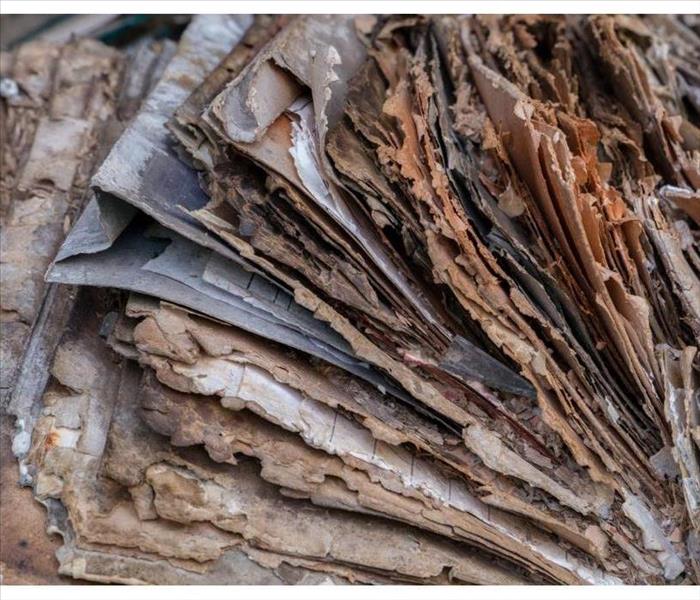 Wet documents can be restored
Wet documents can be restored
Four Methods For Salvaging Your Company's Records
If your business in Coal Mountain, GA experiences flooding, it is possible that your building suffers enough damage to require the services of expert water restoration professionals. Additionally, archives may become soaked. Fortunately, wet documents can be recovered.
1. Freezing
Wrap reports in wax paper, parchment, or sealable plastic bags and then place them in a freezer. If you have time, apply separators between each piece of paperwork. Once your materials have thawed, follow up with one of the below procedures.
2. Air Drying
This option is best for smaller bundles of compromised files. Begin by spreading your items on flat tables. Place fans near your papers, but be sure that the airflow is indirect; otherwise, they may go flying. Blot dampened pages with a soft cloth or towel and then hang them on a clothesline with plastic clothespins. Note that it may take up to two weeks for some wet documents to completely dry.
3. Vacuum Freezing
Vacuum freezing is a better choice when a lot of document drying becomes necessary. Freeze your papers as outlined above and then place them in a vacuum chamber. This piece of equipment can be obtained from a salvage vendor. By using a process known as sublimation, ice crystals vaporize without melting. This assures a minimum of additional stress on the affected reports.
4. Vacuum Thermal Drying
Records that have suffered watery ravages ranging from minor pipe leaks to intense flooding can benefit from vacuum drying. Items are placed within one of these enclosed devices and dehydrated via moisture evaporation. Only use this method with records that do not need to be kept for long periods, as this strategy accelerates aging.
Wet documents are a severe problem for any business, but all is not lost. There is a good chance that a majority of your data may be able to be saved with one of these approaches.
4 Common Causes of Tile Mold
2/2/2021 (Permalink)
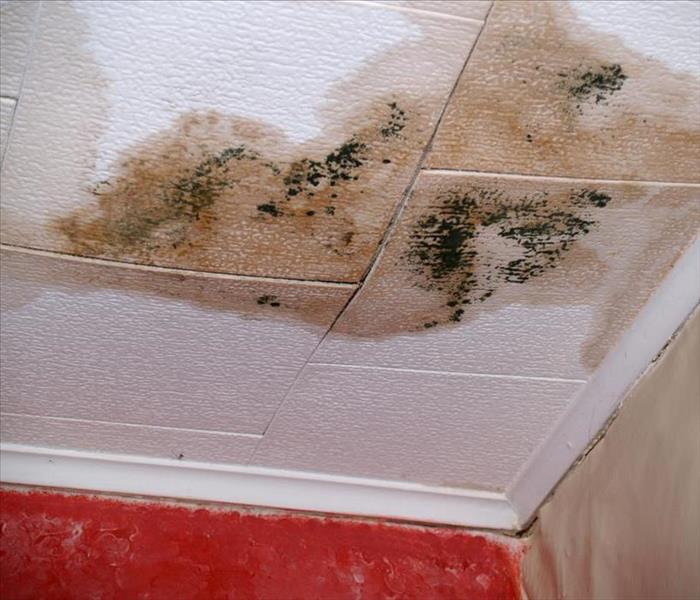 Mold damage on ceiling tiles
Mold damage on ceiling tiles
4 Common Causes of Tile Mold
Finding tile mold in your Cumming, GA building can be disconcerting. While it reveals a fungus problem, you may be in the dark as to how it began. If you want to know how the mold could have formed, here are four common causes of moldy tiles.
1. HVAC Systems
One of the most common causes of tile discoloration is HVAC (heating, ventilating, and air conditioning) leaks. These are a few possible causes for such leaks:
- Clogged drain pipes
- Incorrect maintenance
- Flawed installation
If you find this source of mold, the first step is to turn off your HVAC systems. This prevents further leakage and minimizes the spread of moisture.
2. Vents
Your building may have roof vents for plumbing or air. If this is the case, the area around these vents might be less secure than the rest of the roof. You can pinpoint this cause of water damage by looking for stains around the openings.
3. Roof Flashing
If your roof has a horizontal surface that meets a vertical surface, chances are that you have roof flashing. These are thin pieces of metal that protect important sections of the roof by guiding water away. Flashing may also be installed around holes such as chimneys and skylights. If your flashing isn't working properly, you may get tile mold from these protected areas.
4. Leaking Pipes
The mold on your tiles may be continuously growing over time. This could be due to a leaking pipe, which might consistently drip small amounts of water onto your ceiling tiles. It's especially possible if your building is in a temperate climate or has old pipes. While moldy tiles are generally caused by roof leaks, this could also be an explanation.
Tile mold is never pleasant to find. However, it may be simple to fix. Remember to call a mold remediation company to be certain that it's eradicated.
Do You Have the Right Home Fire Extinguisher?
2/2/2021 (Permalink)
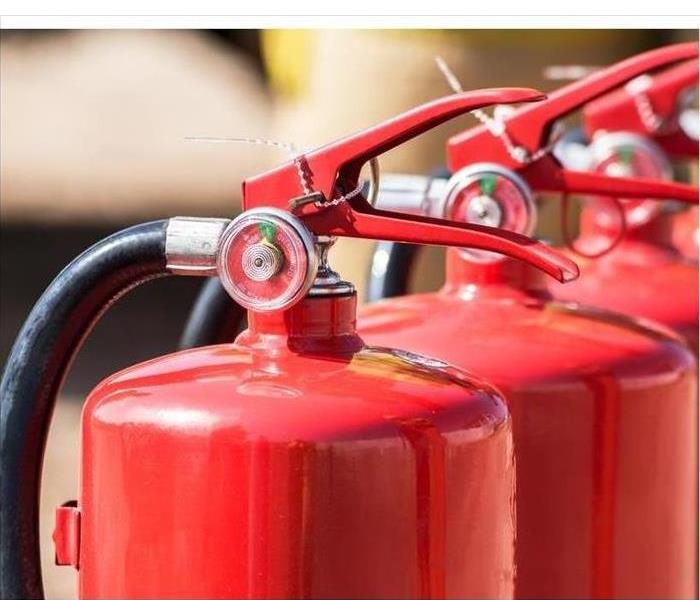 A fire extinguisher must be full and sealed to maintain pressure.
A fire extinguisher must be full and sealed to maintain pressure.
3 Factors That Will Determine the Effectiveness of a Home Fire Extinguisher
Homeowners should take measures to increase their fire preparedness. These three factors will determine the effectiveness of a home fire extinguisher in the event of an emergency.
1. Check the Class
There are several common extinguisher classes distinguished on the basis of fire suppressant compounds. Class A extinguishers contain monoammonium phosphate for ordinary combustibles. Class B and C extinguishers combine monoammonium phosophate with sodium bicarbonate. Class B is intended for flammable liquids or gases other than cooking oils or grease, while Class C is formulated for electrical fires.
Homeowners may want to obtain multi-class fire extinguishers for all of these risks. It is less likely that they will need a Class D extinguisher for combustible metals or even a Class K extinguisher for cooking oils and grease. Extinguishers may actually spread a cooking fire. It is better to douse a kitchen fire in baking soda (sodium bicarbonate) and salt and smother the flames with a metal lid or another pan.
2. Make Sure the Extinguisher Is Filled and Sealed
A fire extinguisher must be full and sealed to maintain pressure. Refillable extinguishers usually have metal valves and cost more up front, though refills cost less than a new disposable model. Disposable extinguishers are more affordable, but are made for one-time use.
3. Check the Expiration Date
An extinguisher may or may not have an expiration date, but this safety equipment does not last forever. An extinguisher should work for anywhere from five to 15 years. Check the pressure gauge to determine whether safety equipment is ready to use.
A fire extinguisher that has insufficient pressure or one that has been used before and has not been replaced or refilled may not function as intended. If a fire damages building materials or contents at a residence in Cumming, GA, mitigation and restoration professionals can clean up damage and complete a rebuild.
Frequently Asked Questions About FEMA
1/15/2021 (Permalink)
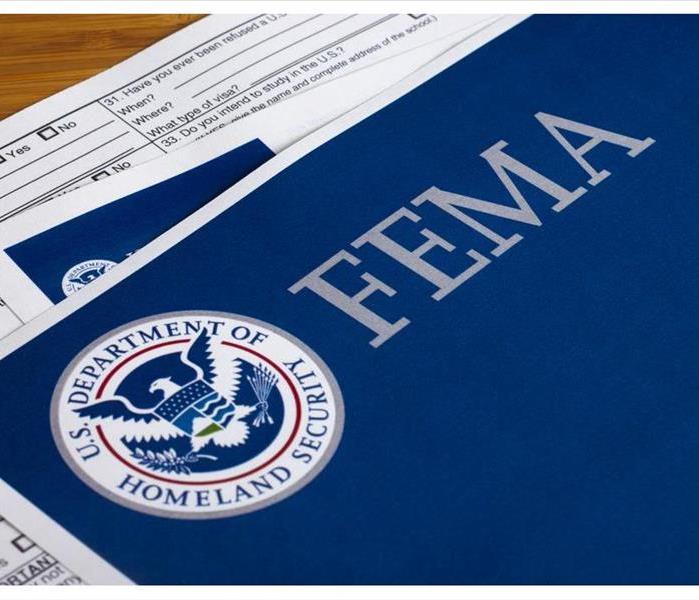 FEMA has grants that could provide financial assistance to the uninsured
FEMA has grants that could provide financial assistance to the uninsured
If you have recently experienced a storm, you may be interested in FEMA individual assistance. Here are some answers to frequently asked questions, so you know a little more about the program.
Who Is Eligible for Assistance?
There are a few qualifications you must meet to get individual assistance. Here are the general qualifications:
- You must be a U.S. citizen, non-citizen national, or qualified alien
- You must be able to verify your identity
- You cannot meet your needs with your current insurance
- A Qualified disaster has caused your needs
Are You Eligible if You Already Have Insurance?
Insurance is the main source of money you should rely on to put your life back together after a storm. Therefore, you are going to want to contact them immediately after the disaster strikes. However, if they do not offer you enough funds to rebuild, you could be eligible for additional assistance from FEMA.
Will FEMA Rebuild Your House?
The individual assistance offered by FEMA is designed to help uninsured or underinsured people pay for necessary expenses after a flood. However, this program is not a substitute for insurance. It is designed to get you back on your feet after a disaster. It cannot completely rebuild your house.
What Low-Interest Loans Are Available?
If you run a small business out of your home, you may be able to borrow enough money to pay for hiring remediation professionals and cover your economic losses. However, this money is designed to come from the Small Business Administration as a low-interest loan.
What Happens After You Apply?
Once you have filed a claim for a disaster in Jasper, GA, you can check on your application's status online. You will be notified of a decision via the online portal and through your primary contact information.
If you have recently experienced flooding, you could be eligible for individual assistance. This can help you get back on your feet after a disaster and ready to rebuild your life.
4 Ways Water Can Damage Your Home
12/28/2020 (Permalink)
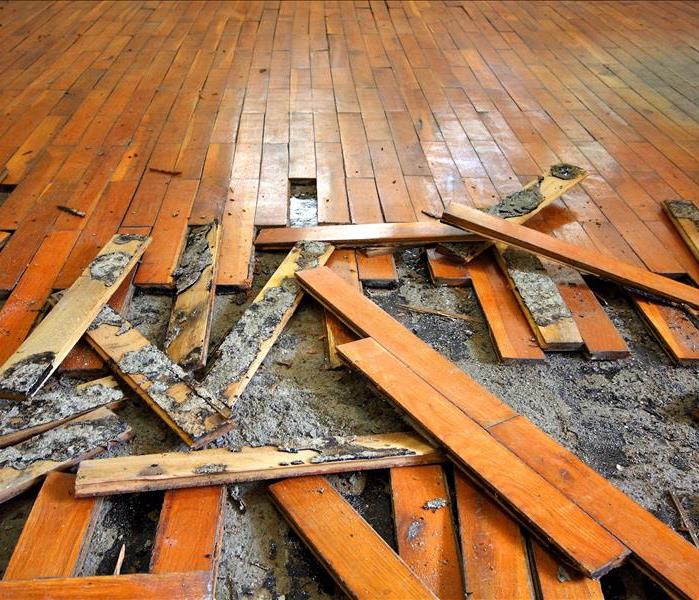 Wooden floor damaged in a Dawsonville, GA home
Wooden floor damaged in a Dawsonville, GA home
4 Ways Water Can Damage Your Home
Is your home in Dawsonville, GA, prone to flooding or heavy rains? It's important to know what kinds of damages, such as swelling wood, water can cause to your home.
1. Walls and Supports
If hail or heavy wind often accompany rainstorms near you, water can quickly get past the standard plastic siding. The hail can break big holes, and the wind can blow water up and behind the siding. Once this happens, there's only a small, thin sheet of wrapping that separates the water from the plywood of your home's structure. Other supports like wooden porch beams are also vulnerable. A common issue after heavy rains is swelling wood. This occurs when the wood is saturated with water and starts to expand and swell. This can compromise the structural integrity of your home.
2. Windows
While it's exciting and fun to watch rain pound against windows while you're safe and cozy in your home, windows are a big structural weakness that require consistent maintenance. The caulking, a type of rubber-like sealant used by workers when your windows were installed, can sometimes come loose, especially if you own an older home. If this happens, water can slip through the cracks between the window and its frame, which will cause water to directly enter your home.
3. Water Pipes
Water pipes: the tangled rat's nets of copper that everyone likes to put out of their mind. Yes, these can be impacted by heavy rains, too. The issue of swelling wood can put pressure on pipes, especially where water enters your home through the exterior in a supply line. It's best to keep an eye on your pipes and consider beforehand how a heavy rain might impact you. If you have the unfortunate luck to suffer a pipe break, however, you can always contact a water damage specialist to quickly clean up the damage.
4. Yard
Your kids might love to splash and play in the mud after a heavy rain, but these downpours can have other, less entertaining, side effects. If there is enough rainwater, or if your home has an inefficient gutter system, rushing water can wash away the dirt around your foundation. This can lead to basement leaks or even crack your foundation if the water freezes after it seeps through the concrete.
As an informed homeowner, you can help prevent water damage before it happens and avoid costly issues such as a water pipe repair.
3 Steps To Take After a Furnace Puffback
12/28/2020 (Permalink)
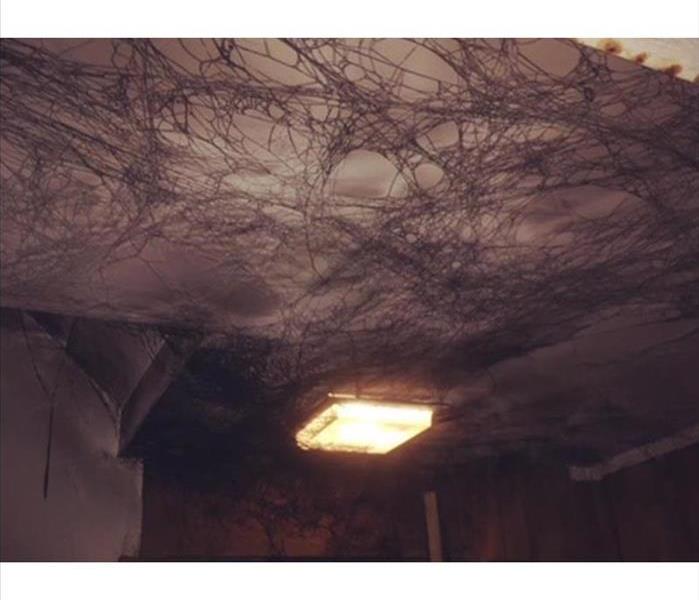 A furnace puff back can create an enormous mess in your building
A furnace puff back can create an enormous mess in your building
Take These Steps To Deal With Puff Backs The Right Way
When a furnace isn’t working properly, fumes and fuel can accumulate in the combustion chamber and ignite, causing a small explosion that forces soot and smoke through the exhaust vents. This occurrence is known as a furnace puffback. A puffback is a cry for help from your building’s furnace, although you could be the one crying when you see the puffback damage to your building. Don’t try to clean this mess up yourself: Take these steps to deal with puff backs the right way.
1. Call a Repairman
Your first step should always be to call a Dahlonega, GA, HVAC professional to repair your building’s heating system. Puffbacks do not occur when furnaces are functioning correctly. Ignoring the problem will likely lead to more mess and possibly even a fire or explosion.
2. Call Your Insurance Company
Inspect the building thoroughly to assess the damage. Soot from a puffback can travel a surprising distance and cover a huge area. It can spread even further by traveling through your building’s ductwork. Puffbacks can leave large black streaks or a fine layer of soot on just about everything, including inside drawers or behind closed doors. Your property insurance may cover the cost to clean up the puffback damage.
3. Call a Professional Cleanup Crew
Never try to clean up the mess from a puffback yourself. Soot is a unique substance that does not simply wipe away like dust. The sticky, oily soot from an oil furnace is particularly challenging to remove, and without professional equipment and training, your cleanup efforts could end up causing more damage. Contact a reliable restoration service with experience dealing with soot damage. These professionals will use the correct cleaning agents and techniques to fully remove soot and soot odor from your building.
A furnace puffback can create an enormous mess in your building. Dealing with puffback damage is frustrating, but restoration professionals have the tools to get your building looking “Like it never even happened.”
4 Sources of Construction Water Damage and How To Avoid Them
12/15/2020 (Permalink)
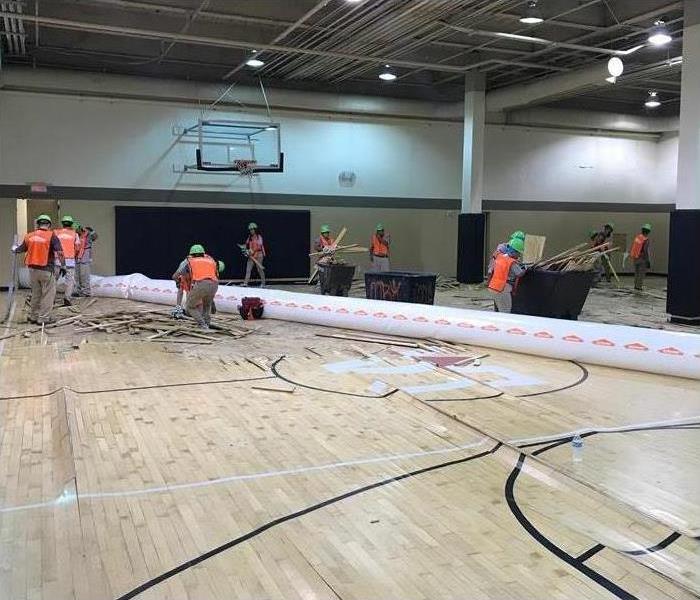 Wood floors damaged by water in Cumming, GA
Wood floors damaged by water in Cumming, GA
Below Are Four Common Problems That Arise And Ways To Avoid Them
Expanding and beginning new construction on a building for your Cumming, GA, business is an exciting time, but it can also be nerve-wracking. If damage happens early on, such as a water pipe repair, it may result in issues down the road. Having a plan in place to mitigate potential water issues that require extensive repairs by a water damage and restoration company is essential. Below are four common problems that arise and ways to avoid them.
1. Unsecured Openings
No matter how safe and secure the site is, Mother Nature is notorious for bringing unwanted weather. Throughout the process, openings, such as windows, doors and elevator shafts, present the perfect opportunity for the construction site to become flooded. Along with keeping an eye on the weather, ensure a checklist is in place to protect those openings. That may include a temporary roof and boarding up windows.
2. Faulty Pipe Installation
An improper connection or plumbing installation will mean facing a water pipe repair down the road. If the system isn’t properly insulated, it may mean dealing with a broken pipe. Testing the system is a vital step. Flow alarms can be activated to help detect any leaks.
3. Site Drainage Issues
If pooling water seems commonplace on the site, you may be facing a blocked or inefficient drain. To avoid that, ensure surrounding soil is properly graded and backfill exposed areas. It may be necessary to put sandbags around the area. Drain screens should also be used to minimize the construction debris causing further issues.
4. Material Storage
Various materials are used in the construction process, and many of them are susceptible to water damage. If rainy weather is on its way, items not properly stored can lead to a building built with pre-damaged components. Ensure the contractor has a plan for storage and uses just-in-time delivery as often as possible. If they must be stored on-site, try and keep them indoors and covered.
The last thing you want to worry about after opening the doors to your new building is a water pipe repair. Formulating a plan and protecting the construction site can minimize issues from happening.
Why Cleaning Up Mold Isn't As Easy As You Think
12/8/2020 (Permalink)
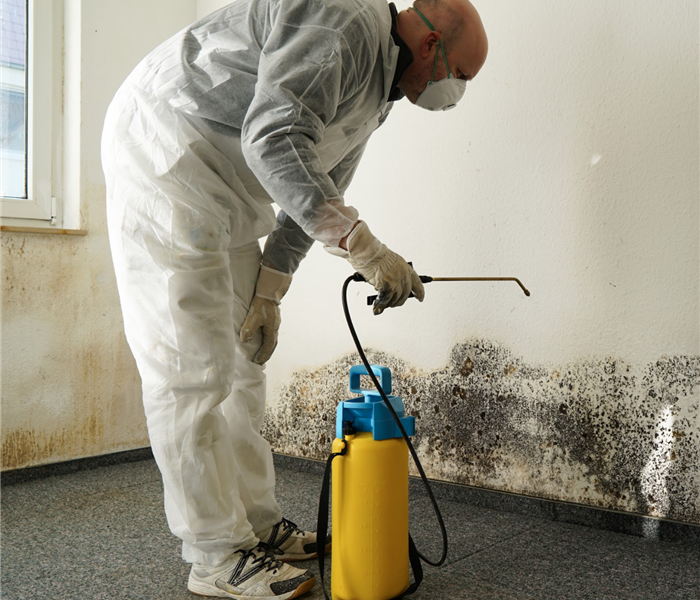 Mold remediation services in Cumming, GA
Mold remediation services in Cumming, GA
Reasons Why Cleaning Up Mold Isn't As Easy As You Think
After a significant water leak at your business in Cumming, GA, you want to handle the cleanup quickly and inexpensively. You know that your insurance will take care of some things, but why shell out to have an expert cleaner come when you can do the work yourself? For fungus cleanup, it's extremely important that you know exactly what you're dealing with before you begin. Mold is made up of spores that are released into the air on contact. Not only do you need to wear protective equipment, but you need to know how to kill the mold at the root. Bleach isn't going to cut it.
1. Mold and Sewage
Mold in the bathroom that is caused by contaminated water, especially from a toilet backup, involves a complex process to cleanup mold. You aren't just dealing with mold but also with the bacteria from contaminated water. For this type of project, you need a plumber and a remediation company that can handle both water and mold damage. This is not a project to take on yourself.
2. Mold and HVAC
If you're suspicious that your HVAC unit may have a moldy filter or has been damaged, it's important to shut off the system immediately. By continuing to run it, mold spores spread all over the building, and the fungus cleanup gets to be a bigger project.
3. Mold and You
For a very small mold problem, which is defined as smaller than 10 square feet by the EPA, you can try to clean it yourself. For a hard, nonporous surface, you can scrub it with detergent and water, and then let it air dry in a well-ventilated area. For any porous surface, it's still best to consult a professional to ensure that the damage doesn't go deeper than what the eye can see.
Fungus cleanup is a much more intense job than it appears. For the long-term benefit of your company, it's best to trust the professionals to restore your building.
7 Ways to Prevent Kitchen Fires
12/8/2020 (Permalink)
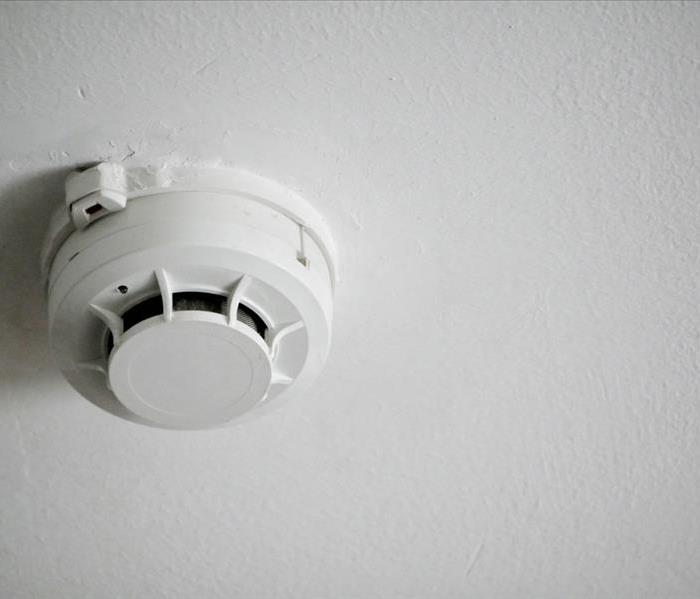 Install a smoke detector
Install a smoke detector
Tips To Keep Your Kitchen Safe From A Fire
You want to keep your kitchen fire-free. This prevents fire damage to your home in Cumming, GA, and keeps you from having to hire a qualified restoration professional. Fortunately, you can follow a few tips to keep your kitchen safe from a fire.
1. Keep Appliances Serviced
One of the best tips you can follow is to ensure your appliances are working and clean. Clean the crumbs out of your toaster oven. Wash the inside of your microwave. Clean your oven. Have any malfunctioning appliances replaced or repaired immediately.
2. Unplug Small Appliances
Another of the top tips you need to follow is to unplug your small appliances when you are not using them. Things like toaster ovens, coffee pots, and mixers can only draw electricity if they are plugged in. Unplugging them prevent these appliances from drawing too much power when they are not on and straining any old wiring.
3. Install a Smoke Detector
Be sure to have smoke detectors in your home. Be sure to place it in a neighboring room that will allow it to detect any kitchen fires, but not let steam set off the alarm.
4. Use Caution With a Gas Stove
Always be careful when lighting your gas stove. Make sure to follow the instructions that came with it.
5. Don’t Put Metal in Your Microwave
Never put metal in your microwave. Microwaved metal will produce sparks that can start a fire in your kitchen.
6. Go Light on the Oil
When cooking with grease or any oil, don't put too much in your pots. This can splash and erupt into flames.
7. Wipe Up Spills
Never cook if you have spills on your stove. Built-up grease can easily catch on fire. Cleaning your stove can improve fire safety.
Due to faulty wiring or a simple grease fire, a kitchen fire is not something you want to experience. Following these simple instructions can help you reduce your chances of a fire.
Common Questions About Black Mold
11/24/2020 (Permalink)
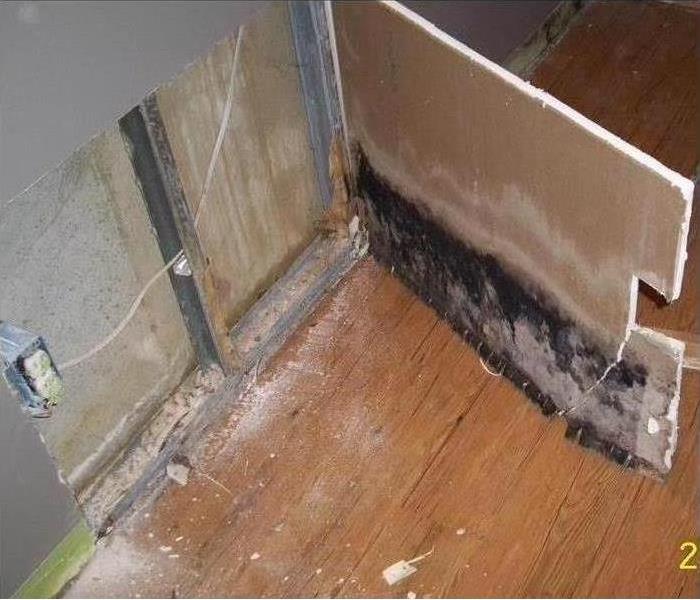 Black mold damage in Dawsonville, GA
Black mold damage in Dawsonville, GA
Read On To Have Your Most Common Questions Answered
If your home in Dawsonville, GA is experiencing unwanted fungal growth, black mold is most likely the culprit. If you're unsure which type of mold you're dealing with, then it's a good idea to have a professional mold inspection conducted, even if it only serves to confirm your suspicions. In the meantime, read on to have your most common questions answered.
1. What Does Black Mold Look Like?
Much like the name implies, this fungus appears black or dark green in color. When you find it, it looks like a dark stain spreading across the surface of the affected area. In some cases, it may even have a fuzzy or a slimy texture.
2. Where Does it Typically Grow?
This specific variety of mold needs water in order to thrive. As such, you can typically find it growing in areas of your home that come into contact with a lot of water, such as your kitchen, bathroom, basement, laundry room and garage. It's not uncommon to discover it growing in areas that have recently suffered from water damage as well.
3. How Do You Get Mold?
House mold is a result of excessive moisture. This can come in the form of especially high indoor humidity levels, excessive amounts of condensation or simply neglecting to clean spills and puddles for too long. Mold growth is also a form of secondary damage after a flood. If your home has recently suffered any type of water damage, then you should have a professional mold inspection conducted.
4. How Can You Get Rid of Mold?
The good news is that you should be able to solve the majority of mold problems by yourself, provided they haven't gone unnoticed for too long. You can use commercial mold cleaners to do the job, or create your own non-toxic cleaner using equal parts white vinegar and water.
Always make sure to call for a professional mold inspection if you're unsure of the situation. Likewise, you should contact mold remediation experts if you find that your home's mold issue is too large for you to handle by yourself.
Preventing Water Damage When You're Away from Home
11/23/2020 (Permalink)
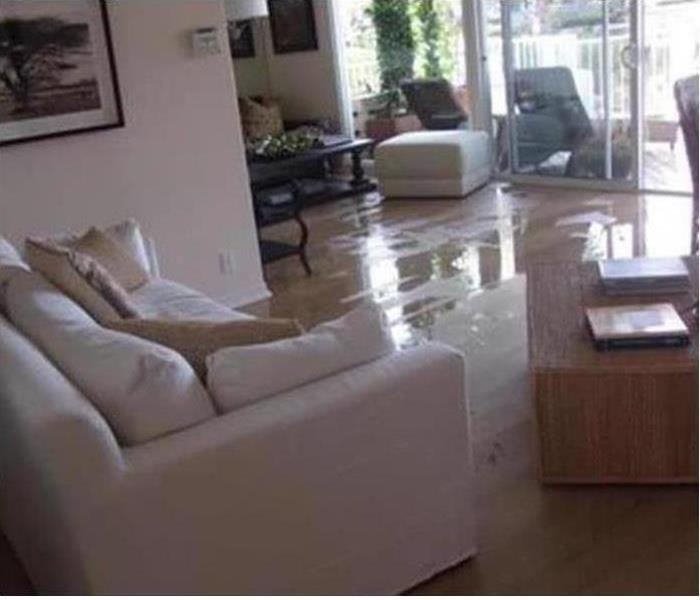 Water damage in Cumming, GA
Water damage in Cumming, GA
Preventing Water Damage When You're Away from Home
A broken water pipe is one of the most common causes of damage to homes in Cumming, GA. If you're home when the disaster occurs, you have the ability to act fast to ensure it is cleaned up and you're able to call someone to perform your water pipe repair. If you're away when it happens, such as on vacation or an extended business trip, you could come home to a major problem.
Know the Common Causes
Knowing what causes a broken pipe can help you protect against it happening. The most common causes of water pipe breaks are:
- Freezing temperatures
- Corrosion
- High water pressure
- Clogs
- Tree roots
You don't want to have a pipe break at any time, but especially while you're away and unable to make sure a water pipe repair and cleanup happens. You would return to a flooded home with secondary damage, including structural and mold. If you experience this type of damage, always work with a professional restoration company so you and your family remain safe.
Preventing Pipe Breaks
Before leaving town for any amount of time, always know your pipes are in good working order. Inspect under your sinks and around the water heater. Also check the hoses around your appliances, such as your washing machine, refrigerator, and dishwasher. If hoses look worn, replace them.
If the temperatures are going to be cold while you're away, provide your pipes with insulation. You should be doing this anyway. Make sure your outdoor hoses are disconnected and your spigots are covered with bib protectors.
Last, find a friend or family member to check in on your home often. If you don't have someone who can do this, shut off the main water and drain the pipes. Flush the toilets to empty them as well, and leave your cupboards under the sinks open to help keep the pipes warm.
You want to be home when there is any need for a water pipe repair. A busted water pipe will always cause a mess, but it doesn't have to cause damage. Damage is preventable when you take the extra steps to be proactive.
What to Expect When You Call a Fire Mitigation Professional
11/11/2020 (Permalink)
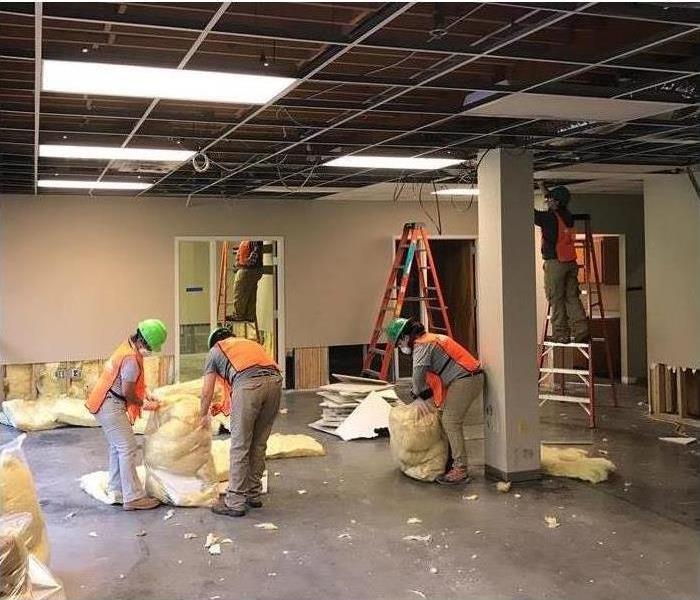 Commercial fire cleanup
Commercial fire cleanup
What to Expect When You Call a Fire Mitigation Professional
When your Jasper, GA, business has an incident resulting in fire damage, you may not know what to expect throughout the restoration process. If you choose to work with a mitigation team to bring your facility back to an operational state, look for the following four steps to take place.
1. Assessment of Damage
After the fire is put out, and you are left with the bones of what was once a functional business place, a fire mitigation crew can come to your facility and access the situation. These professionals will determine the severity of damage and what work is needed for a full restoration. You may wish to have an insurance adjuster on-site to evaluate the costs involved in the clean-up and rebuilding process.
2. Preventative Measures
After the extent of the fire damage has been determined, a mitigation team will determine is safety and damage prevention is needed on the site. Following a fire, the building's integrity may be compromised. Preventing further damage might require some of the following measures from your mitigation expert:
- Boards over broken windows
- Placing tarps over fire-damaged roofing
- Boarding up damaged walls to prevent water damage
3. Restoration Preparation
Once relative safety is in order, it will be time for preparing the space for restoration. Before restoration can take place, removal of contaminants is essential. Special equipment used by the commercial restoration company will ensure water, smoke, soot and odors are eliminated before new materials are installed.
4. Commercial Restoration
Once you make it through the accessing, preventative and preparatory phases, it will be time to restore your facility to a fully safe and functional state. The restoration process can involve many steps and may require a large crew depending on the degree of fire damage that occurred at your commercial facility. New drywall, paint or flooring are common repairs after a fire. For more serious restoration, a construction team may need to rebuild entirely to fully bring back your commercial space.
Contact a local mitigation team to start the path towards restoring your Jasper, GA, business. Watch for these basic steps to occur as you get your facility back to where it was before.
3 Tips for Effectively Handling Water Damage in Your Commercial Property
11/11/2020 (Permalink)
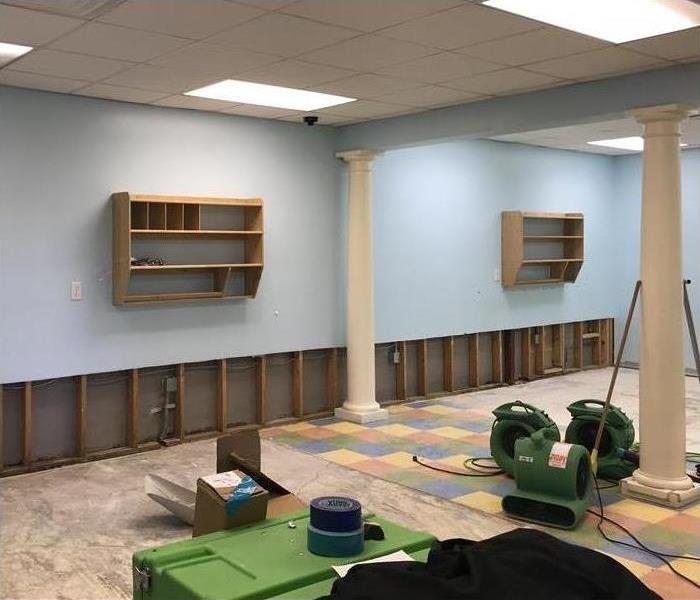 Dry your building out using fans or dehumidifiers
Dry your building out using fans or dehumidifiers
Here Are Three Tips For Handling Water Damage
Water damage is not an uncommon occurrence in the business world. Besides the ever-present risk of a natural disaster like a hurricane, there can be harm done to property by everyday problems like broken pipes. In the event your commercial property in Mcdaniel, GA, ever suffers from an unexpected flood, it is important to know how to handle it. It is generally recommended that a professional cleanup and restoration service be employed for water cleanup, building restoration and content repairs, but there are some steps business owners can take themselves in the aftermath of a water disaster while waiting for the professionals.
1. Contact Your Insurance Company
It is important to call your insurance company as soon as possible after an event resulting in water damage. It takes time for insurance companies to process claims, and the order in which claims are made does not necessarily determine the order in which they are paid out. The sooner you get the ball rolling, the better.
2. Prepare for the Insurance Adjuster's Visit
After speaking with the insurance company, you should prepare for a visit from an insurance adjuster, the person who will determine how much you receive from your insurance policy. Being ready can speed up the claim process and ensure you get the amount your policy entitles you to. Here are some steps you should take in preparation:
- Create an itemized list of damages and lost contents.
- Take pictures of the damage.
- Read every detail of your policy closely.
3. Cleanup Where Possible
Even before the professional restoration company has arrived, you should begin the recovery process by cleaning up what is safe to. This includes starting to dry the building out using fans or dehumidifiers and removing standing water if possible. If the water continues to flow from a source you can stop, you need to stop it, whether that means calling a plumber or turning off the water at the main supply line.
Water can devastate property. Water cleanup should begin as soon as possible to minimize harm, so consider following these tips as you handle your flooded property.
Roof Leaks: Finding and Repairing the Culprit
11/11/2020 (Permalink)
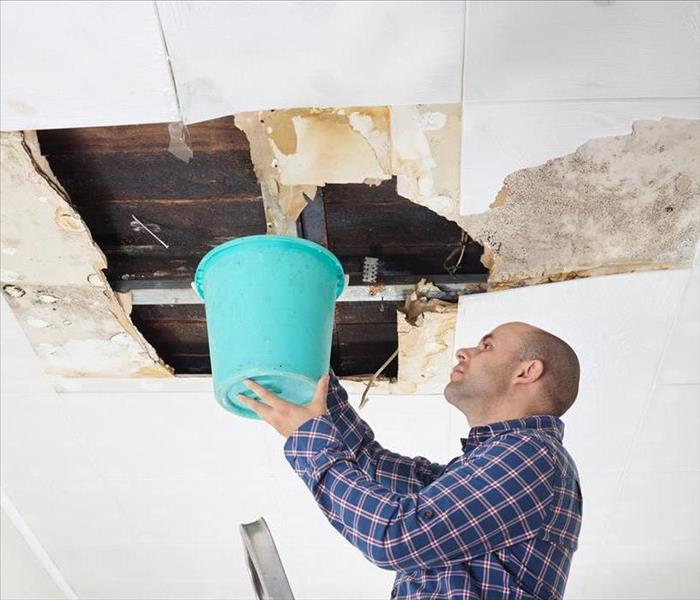 Roof leak in the Talking Rock, GA building
Roof leak in the Talking Rock, GA building
In 2021, can be easy to forget that the roof covering over your Talking Rock, GA, or Amicalola, GA business is vital to protecting everything within. The moment a roof leak happens, it quickly comes to the foreground. The degree of the damage will determine if a repair or replacement is needed. When dealing with a damaged roof, it is essential to determine the cause and immediately make needed repairs
Find the Source of the Roof Leak
Whether old or new, a number of culprits could cause a leak. If signs of a leak appear, below are the most frequent culprits.
Damaged or Missing Shingles – Weather can eventually begin to wreak havoc on a roof. From heavy rains to high winds and hail, the shingles can be blown off, loosened or cracked. When that happens the protective layers beneath them begin to deteriorate from exposure.
Cracked Flashing – Commercial buildings often have an array of attachments on their roofs. Whether it is a skylight or plumbing vents, those protrusions are sealed with rubber or metal flashing. If the seal begins to crack, it creates a prime place for water to begin dripping in.
Clogged Gutters – Proper drainage is essential to prevent leaks and flooding. If gutters or downspouts are clogged, it means water is pooling on the roof instead of flowing away from the property.
Repair Expectations
Once you find the source of the roof leak, quick action is needed to prevent further damage. The repair process may be as easy as replacing shingles or flashing or require more extensive work. Whether doing the repair on your own or hiring a professional, any saturate materials should be torn out and replaced to prevent mold growth. A water damage and restoration professional can help properly restore, clean and deodorize the affected area.
When a roof leak happens, finding the source and making repairs is essential to protecting your business and limiting damage.
3 Tips for Flood Cleaning in Your Home
10/20/2020 (Permalink)
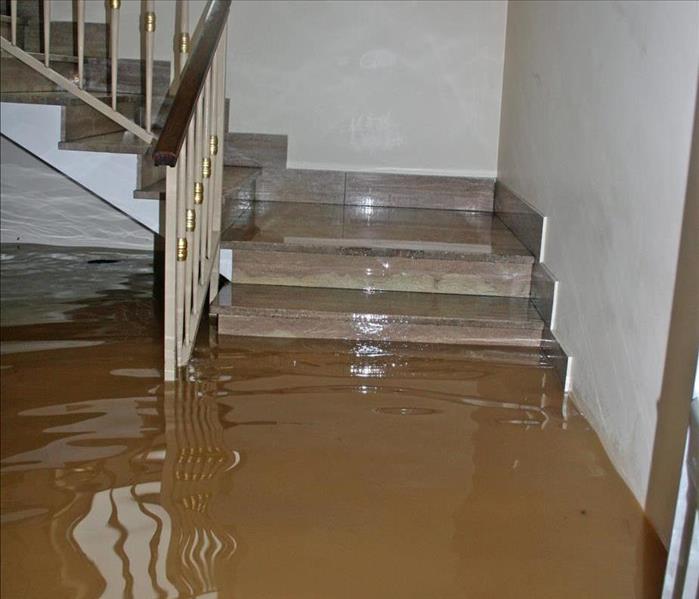 Storm causes flooding in a Dahlonega, GA home
Storm causes flooding in a Dahlonega, GA home
Flood Cleanup Process
After a storm causes flooding in your Dahlonega, GA, home, you may find yourself wondering the best way to clean up the mess, what cleaning requirements will need to be met, and what kind of equipment can be used.
1. Contact a Professional
After a storm causes flooding at your home a storm damage restoration service can perform a flood clean of the affected area. Contacting a professional service like this can help ensure that the people working to remove any flood waste are trained in the correct procedures and have access to any equipment they may need. A professional team can also look for any secondary damaged that may cause your home problems in the long term.
2. Follow Safety Guidelines
There are safety guidelines for a flood clean that include cleaning requirements. These are in place to help ensure that bacteria and other substances that may be carried by floodwater are removed correctly. A restoration service should have team members who are trained to know what the requirements are and how to follow them. In many cases, these are certified professionals capable of reaching the standard goals set by the CDC.
3. Use the Correct Equipment
It’s important to use the right equipment for the job any time you remove flood water from your home. Ensure that any pumps are rated for use with water, that personal protective gear is worn, and that a flood disinfectant is used for cleaning afterward. Using the right equipment is one way to ensure the job is done well, as well as ensuring that any cleaning methods use fall under EPA guidelines.
When working on a flood cleaning in your home you may want to contact a professional as they can help make sure that the cleaning requirements are met. Make sure to follow any recommended safety guidelines, and use the correct equipment for the job. If you have questions your restoration team should be able to help.
Is Your Shower Leaking?
10/13/2020 (Permalink)
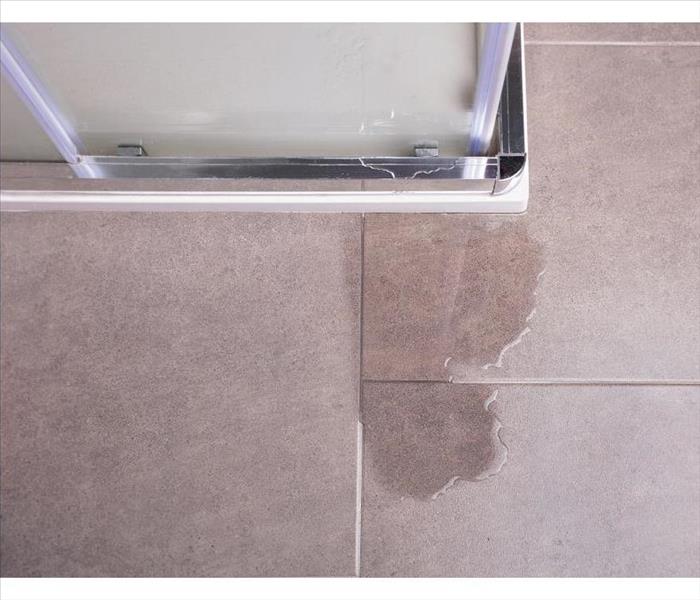 Signs your shower is leaking
Signs your shower is leaking
A shower or bathtub leak might be a common household issue, but that doesn't make it any easier to deal with. The water damage that a leaky shower can potentially cause only serves to pave the way for subsequent issues, such as unwanted mold growth. If you suspect that your home in Dawsonville, GA, might have a leaky shower or bathtub, take a look at the following tips.
Signs Your Shower is Leaking
The following are some of the most common, tell-tale signs that your shower or bathtub is leaking:
- Peeling, flaking or otherwise morphed bathroom paint
- Water stains in the ceiling on the floor directly below your shower or bathtub
- Mold or mildew growth in your bathroom
Identify the Source of the Leak
A shower pan leak can come in several different forms, and it's important to identify the issue before you set out to fix it. It's possible that your shower or bathtub leak is simply the result of an inadequate seal. Try spraying water all around the shower, including up against the glass or closed curtain, to see where the moisture is escaping from. Also make sure to check your shower's caulking, as these materials can crack and break as they age, losing their effectiveness. If you can identify where the water is escaping from, then your shower leak is simply a matter of replacing the grout or caulking. If doing so doesn't yield any definite results, your leak might be related to a shower tray or drain issue. If this is the case, you should hire professionals to test for leaks.
There are several different incidents that could have caused your shower or bathtub leak. Regardless of where the leak came from, you need to take the situation seriously and take immediate action to remedy the problem. Water damage can wreck havoc on your residential property if left untreated. If you can't identify the source of the leak or need help fixing the damage, contact water remediation experts for professional assistance.
Mold: Always There But Preventable
9/30/2020 (Permalink)
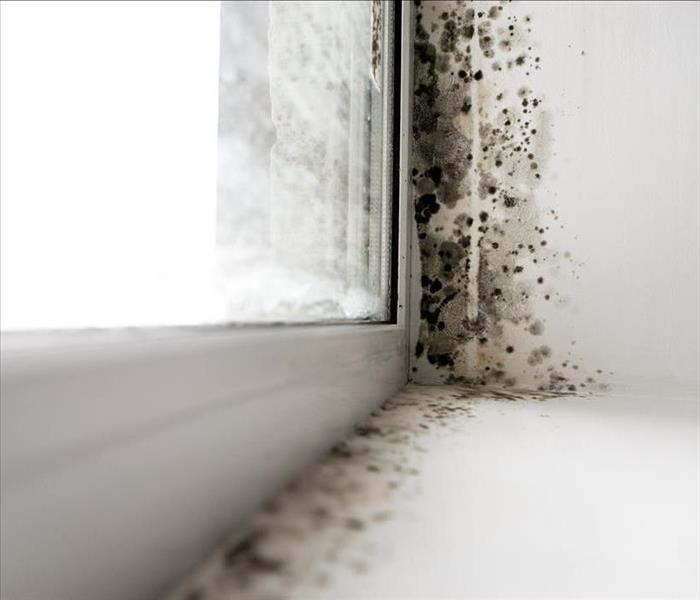 Black mold growth on the corner of a window
Black mold growth on the corner of a window
What To Do If You Have A Mold Problem And It's Not Going Away
When your Cumming, GA, home is your castle, the last thing you want is a musty odor to linger. Unfortunately, even if you have addressed a black mold issue and think your home is free and clear, this pesky fungus has a way of never really going away.
A Common Problem
When it comes to mold cleanup, it can seem like a never-ending battle. No matter how old or new a home is, these spores are everywhere. To reduce the potential of mold damage, it is important to understand how it works.
This simple microorganism only needs food, moisture, and a pleasant temperature to grow. Homes are filled with tasty organic materials they can thrive on when water is present.
Since the spores are microscopic, they can easily find their way into a home through HVAC systems, vents, and open windows or doors. They can also attach to clothing and pets.
They are everywhere indoors and outdoors, so it’s never possible to completely eradicate them from a home.
Spores only need a few days to start forming a colony and begin growing.
Tips to Reduce Growth
Since black mold has the potential to grow anywhere and come back, mold remediation and prevention are the keys from it spreading. Below are a few tips to minimize the spread:
- Keep humidity levels under 60 percent.
- Regular dry, clean and sanitize porous materials.
- Repair leaks as soon as they are discovered, whether it is from an appliance, old pipe or HVAC drain. Replace dilapidated old pipes.
- Dry wet items before storing them in the home.
- Ensure your home is well-ventilated and has good airflow.
- At the first signs of growth, contact a professional water and mold damage restoration company to have the problem properly addressed.
Finding black mold is unpleasant, especially if it keeps turning up. Taking a few proactive measures and getting help that is Faster to Any Size Disaster can minimize the potential of spores from growing.
4 Important Tips To Prevent Kitchen Fires
9/18/2020 (Permalink)
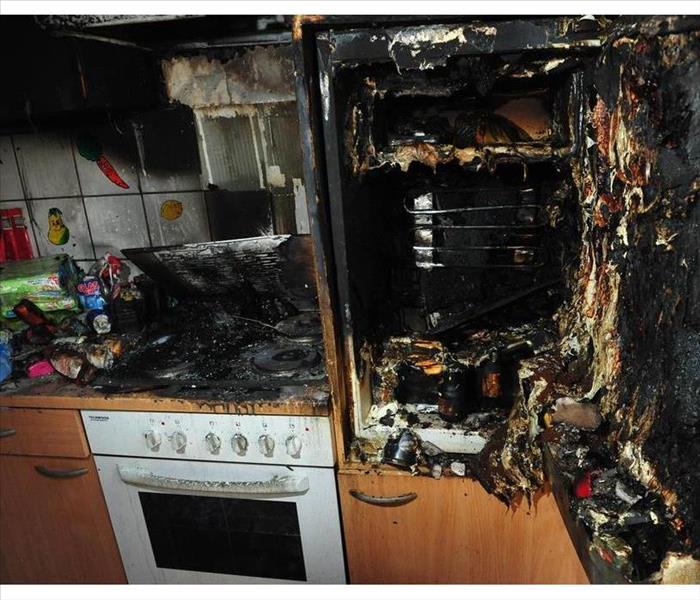 Kitchen fire damage in Holcombe, GA
Kitchen fire damage in Holcombe, GA
Tips To Avoid a Kitchen Fire
If you live in Holcombe, GA, you probably spend a lot of time in your home’s kitchen — which is also the room where most home fires start. Here are a few simple safety tips to help you avoid a kitchen fire.
1. Don't Forget About Your Food
Stay in the kitchen when you're using the stove, and watch out for warning signs, such as a smoking pan or boiling-over pot. Always set a timer, even for short cooking times. When you're finished cooking, be sure to turn off the burners or oven.
2. Keep Your Cooking Space Clean and Clear
Spills and grease spatters can ignite quickly, so be sure to wipe down your stove and clean your oven regularly. Keep the area around the stove clear of flammable items, like potholders, paper towels or cookbooks. Fire can quickly spread to these objects; in fact, fire restoration experts say this is one of the most common ways that grease fires spread to the rest of the kitchen and beyond.
3. Don’t Put Metal in the Microwave
This is one of the best-known fire prevention tips, but microwave fires remain extremely common. Utensils or aluminum foil are obvious sources of metal, but metal can also be present in other places, such twist-ties, takeout container handles, or the remnants of foil seals. Carefully check everything you put in the microwave to ensure it is microwave-safe.
4. Be Prepared To Smother Flames Quickly
A fire extinguisher is your best bet to stop a fire, so keep one in your kitchen or nearby. If you don’t have an extinguisher, throw baking soda onto the fire. Never put water on a grease fire! If the flames are in a pan, cover the pan with a lid (or a large cookie sheet). If the fire is in the oven, close the oven door and turn off the oven.
While you can’t eliminate every fire hazard from your kitchen, following these tips will go a long way toward keeping you and your home safe from fire damage.
Does Your Commercial Insurance Policy Cover Mold Damage?
9/9/2020 (Permalink)
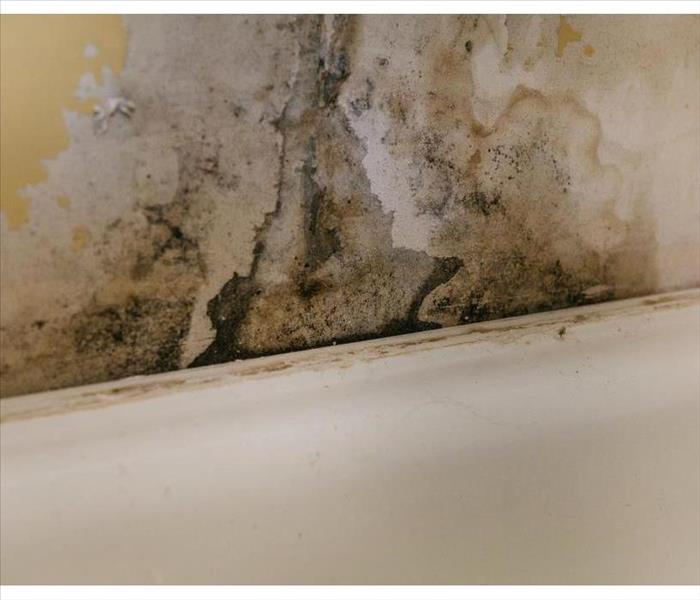 Mold damage in Ludville, GA
Mold damage in Ludville, GA
After a flood, leak, or similar disaster, you do not just have to worry about water damage in your building. The increased moisture could also encourage the growth of mold. You may thus be wondering if your commercial insurance policy covers the cost of mold cleanup.
More About Mold
Mold is a fungus that reproduces using spores. These spores grow anywhere that has:
- Oxygen
- Heat
- Food
- Moisture
Mold can thus appear in many parts of your Ludville, GA, commercial building. It can spread on wood, paper, carpet, and drywall. It may also be in hidden locations such as the ducts. Mold becomes particularly problematic in humid or moist areas.
Mold and Insurance
To limit the spread of mold, you should thus address any moisture problems on your property right away. This is particularly important because most commercial insurance policies include fungus exclusions. In other words, they do not cover most losses that result from mold.
Limited Fungus Coverage
You may still have some mold insurance coverage, however. Many policies will help you pay for mold damage repairs if the fungus resulted from a specific loss such as a fire, sinkhole, or burst pipe.
This coverage applies to any direct damage or loss caused by the fungus. The insurance additionally covers mold remediation services. This includes the cost of tearing out and replacing walls to reach the contaminated areas. Any tests you perform to ensure the mold is gone should be covered, as well.
Keep in mind that this insurance is only available if you take all reasonable steps to limit the harm to your property. The coverage is also usually limited to $15,000 per year or occurrence.
You may be able to use your commercial insurance to pay for black mold cleanup. However, mold damage that does not result from a sudden peril may be excluded. You also may be denied coverage if you fail to take proper steps to mitigate mold growth.
3 Reasons To Choose a Mitigation Company To Rebuild Your Business
8/25/2020 (Permalink)
If your property in Holcombe, GA, sustains fire damage, mitigation and restoration will likely be priorities for you as a business owner. Businesses often hire separate companies to provide mitigation and restoration services. However, there are several benefits to employing the same company to provide both immediate loss prevention and any follow-up repairs and renovation.
1. A Quick Response
When your business has been affected by a fire, you likely will want mitigation and restoration efforts to begin as quickly as possible. However, it can be time-consuming if you have to contact two separate companies and schedule a time when each company can visit your building. A mitigation company that also performs restoration can provide you with a timely assessment of your business. A single company can also quickly provide your insurance adjuster with information about the state of your business.
2. Excellent Communication
After your business has sustained fire damage, it can be frustrating to go back and forth between a mitigation company and a restoration company. Communication is essential during the mitigation and restoration process. If two companies are unable to communicate with one another well, this can cause both processes to come to a halt. However, using a fire mitigation and restoration company can help to ensure that no important details are overlooked, ultimately helping your business to reopen more quickly.
3. Effective and Thorough Mitigation and Restoration
Hiring two different companies to mitigate the damage and restore your business could mean the quality of work may vary. Each company will likely have its own set of standards, and hiring an excellent mitigation company and a sub-par restoration company, or vice versa, could result in an unsatisfactory result. When you hire an experienced company to mitigate damage and restore your property, however, you can trust that you will receive consistent, high-quality results.
A mitigation and restoration company can respond quickly to a disaster, communicate effectively, thoroughly mitigate the damage and restore your business. Choosing a mitigation company to restore your business after your property has sustained fire damage can ultimately help to save you time, money and stress.
Use Caution During Flood Cleanup
8/7/2020 (Permalink)
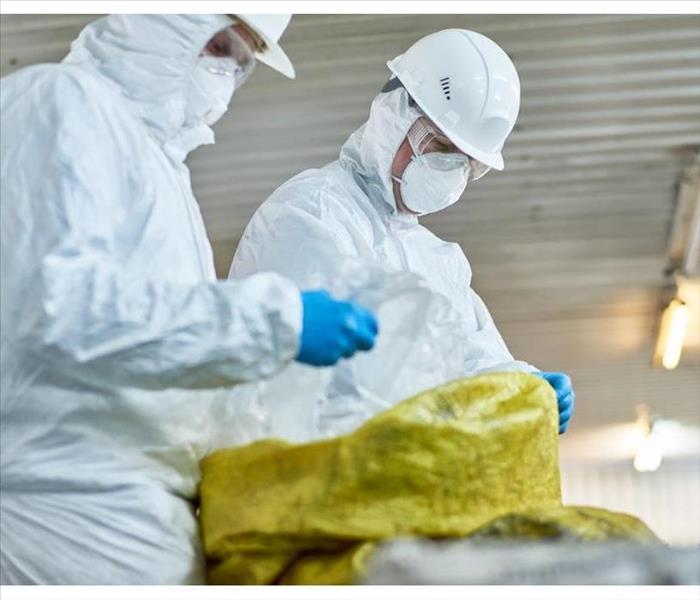 It is important to arm yourself with protective gear
It is important to arm yourself with protective gear
After raging waters rise in your Talking Rock, GA, home, safety has to always be the top concern. Once the flooding subsides, the main priority doesn’t change. The flood clean up process is complex and time-consuming. Unlike a pipe break, people are dealing with water that is potentially contaminated with sewage and other debris. Before diving into the work, unique cleaning requirements need to be considered.
Vital Safety Measures
Before dealing with anything that has come in contact with the floodwaters, it is important to arm yourself with protective gear. This includes wearing:
- Long pants
- Long-sleeved shirt
- Boots
- Disposable rubber gloves
- Goggles
- Face mask
This gear will create a barrier from the contaminants, which may include new mold growth, being breathed in or moved to unaffected areas. Safety gear should be worn whenever going into the affected area or handling any items.
Clean and Sanitize
Presented with the aftermath, the cleaning requirements go far beyond a simple dry out and wipe down. Along with drying out the home to avoid mold, proper cleaning will eliminate the potential bacteria and viruses that have entered the home. A flood disinfectant needs to be used on all surfaces to prevent the spread of contamination. Any items that can’t be cleaned or are saturated should be thrown away. Clothing, curtains and other textiles should be washed as soon as possible.
If the flooding is overwhelming, the best bet is to call a water remediation and restoration expert. They will have the expertise and tools to ensure a home is properly cleaned and restored. They also have the gear on hand to tackle the biggest problems and know-how to salvage more personal belongings than people may realize.
After a flood, people want to get things back to normal as soon as possible. Before jumping into the process, it is vital to follow cleaning requirements to ensure it is done safely and the right way.
3 Tips for Keeping Your Bathrooms Free of Mildew
7/29/2020 (Permalink)
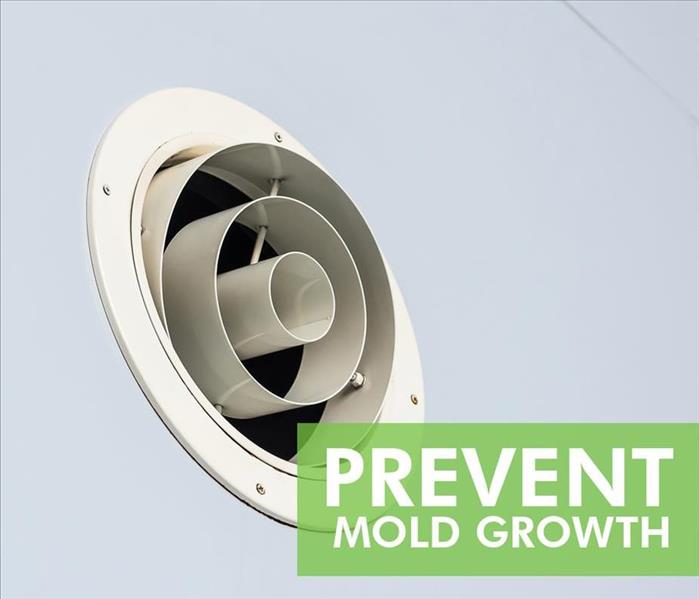 Bathrooms with a shower should be properly ventilated to prevent mold growth due to humidity
Bathrooms with a shower should be properly ventilated to prevent mold growth due to humidity
Tips To Keep Your Bathroom Free of Mildew and Mold
Bathrooms are one of the most humid areas in your home. Between steamy showers, blow-drying, and sink usage, heat, and moisture can easily become trapped together in this small enclosed area. Bathroom mildew is a common occurrence in residential bathrooms. It can present itself in stained or decaying grout, mold in toilets and sinks, or even on walls and counter surfaces. In order to keep your bathroom looking and smelling fresh, try these three tips to keep your bathroom free of mildew and mold.
1. Prevention
One of the best methods for preventing bathroom mildew and mold is with proper ventilation. If your bathroom is equipped with a window, try cracking it after showering to release some of the moisture trapped in the air. If this is not possible, using a circulation fan regularly will help keep fresh air flowing through the space. Airflow will reduce the humidity in the room. Likewise, toweling off wet surfaces to reduce sitting water can help preserve areas where mildew is common such as in shower corners or along grout lines.
2. Treatment
If mildew or mold does occur in your bathroom, start with a simple cleansing method such as one of the following:
- Baking soda and vinegar
- Bleach
- Ammonia
- Rubbing alcohol
If the mildew or mold has caused dark staining, try soaking the area with a cleanser for several hours before scrubbing the surface and rinsing with clean water. When the stain is removed, dry the affected area with a clean cloth to prevent mildew and mold from reoccurring.
3. Removal
In some cases, a severe humidity problem can lead to more permanent damage. If mold and mildew have had a lasting effect on bathroom fixtures or flooring a Mcdaniel, GA, mold removal company may be needed to assist you in the restoration process. Taking out disintegrated grout, tile or carpeting can help get rid of unpleasant bathroom mildew smells and stains.
How To Remove Smoke Odor Damage
7/9/2020 (Permalink)
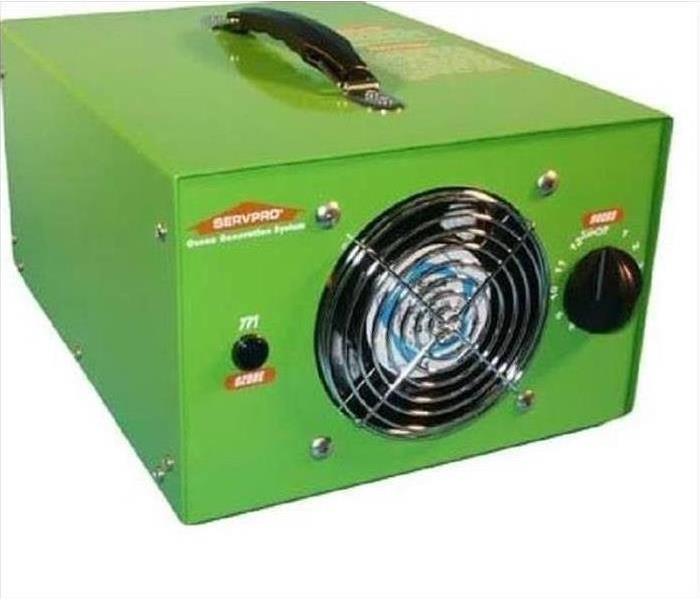 Ozone generators work by breaking oxygen molecules apart
Ozone generators work by breaking oxygen molecules apart
Methods To Remove Smoke Odor
If you have experienced a fire in, Jasper, GA, you may need to perform smoke cleaning to finish the restoration process. Fires can leave many types of damage in their wake. Once the structural damage is fixed, you may find that your building smells like smoke. Nasty odors can hide in carpets, walls, or other porous surfaces. Luckily, there are several effective methods that are commonly used to remove smoke odors.
1. Air Filtration Devices
Air scrubbers and air purifiers are both used as air filtration devices. Air scrubbers are the more powerful version and are used when there are a large number of pollutants. These devices work by sucking the air in and running it through a filter that traps small particulates and then releases the clean air back into the room. When using HEPA filters in the machines, 99.97% of particles are removed from the air.
2. Ozone Machines
Ozone generators work by breaking oxygen molecules apart. The single oxygen molecules bond with other oxygen molecules to create ozone molecules. The ozone molecules break down harmful VOCs, protein smoke, and other chemicals often caused by smoke damage. Ozone generators must be set and then left to run while no one is in the building. Once the machine has finished its smoke cleaning job, it will be safe to enter.
3. Thermal Foggers
When using a fogging machine, everyone must wear protective clothing while operating the machines. Thermal foggers use a petroleum-based deodorizer to neutralize smoke odor. The fog then permeates the area, while filling rooms and tiny cracks and crevices. Once fog dissipates, the odors should be gone.
To get rid of odors for good, use a professional restoration service that specializes in smoke cleaning. This is often the last step in restoring your property after a devastating fire and will leave your building "Like it never even happened."
3 Dangers of Sewage Backup
6/13/2020 (Permalink)
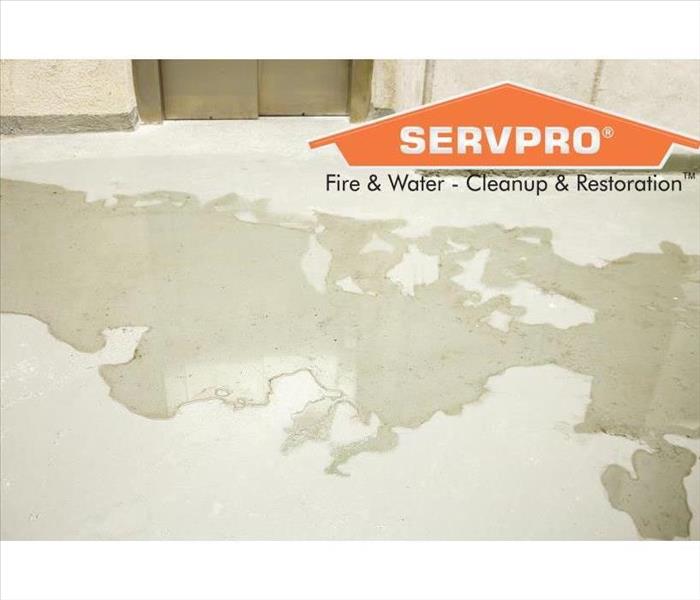 A sewage backup is a serious problem, one that can damage your property and derail your business
A sewage backup is a serious problem, one that can damage your property and derail your business
3 Dangers of Sewage Backup
A sewage backup can strike at any time, but it is especially common after a hurricane or flood. Even without a natural disaster, a clogged pipe can cause massive damage to your Dahlonega, GA, business. Here are three of the biggest dangers of waiting to call a fast-response sewage cleaning service after a toilet overflow or other sewage-related event.
1. Safety Hazard
Most obviously, sewage backup represents a health risk to you and your customers. The EPA cautions that overflow can contain intestinal worms, mold, fungi, and other pathogens. Exposure to blackwater — sewage that contains human fecal matter — can lead to life-threatening illnesses such as cholera, hepatitis, and dysentery. Thorough cleaning with the right equipment is the best way to neutralize these dangers.
2. Loss of Revenue
Given the nature of these safety hazards, a sewage overflow cannot be managed properly while your business is still open. Depending on the kind of damage, your business could be closed from a couple of days to several weeks. Closing your business means losing revenue, which is why immediate, fast sewage cleaning is an essential part of any disaster response.
3. Water Damage
The amount of time it takes to clean and restore a business after a sewage backup is entirely dependent on the kind of damage the backup does. Blackwater can cause more serious damage and expose people to dangerous microorganisms, but even uncontaminated water can leave permanent and unsightly stains. Experienced, well-trained water restoration specialists from SERVPRO can mitigate this damage and complete the job quickly to get your business running again.
A sewage backup is a serious problem, one that can damage your property and derail your business. Calling a SERVPRO sewage cleaning team gives you the best chance to prevent further damage and allows you to reopen promptly with the confidence that your business is as safe and secure as possible.
We are Cleaning Experts
3/20/2020 (Permalink)
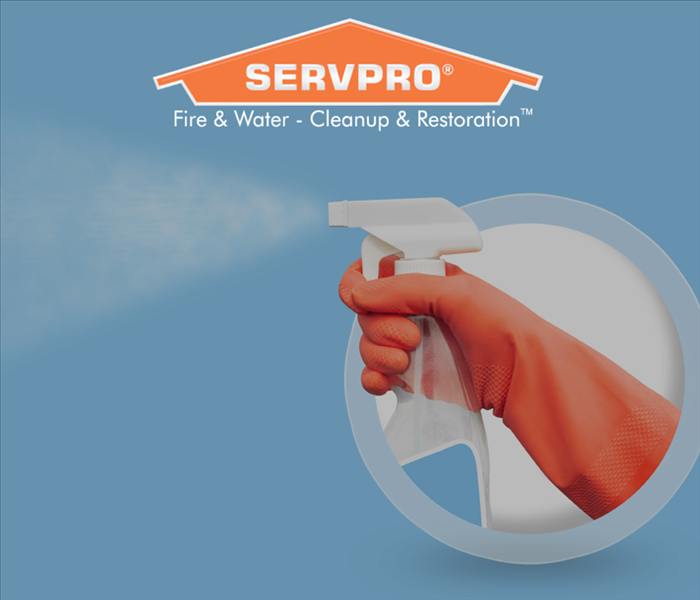 We can handle residential and commercial sanitization jobs
We can handle residential and commercial sanitization jobs
SERVPRO is Here to Help during this time of need
During this unprecedented time caused by the global pandemic of coronavirus, this is a reminder to our customers that we are specialists in cleaning services, and we adhere to the highest cleaning and sanitation standards.
Specialized Training
We are prepared to clean and disinfect your home or business, according to protocols set forth by the Centers for Disease Control and Prevention. We have years of experience in dealing with biological contaminants, and we will go beyond the scope of work that regular janitorial staff perform on a daily basis.
The CDC encourages cleaning of high-touch surfaces such as counters, tabletops, doorknobs, light switches, bathroom fixtures, toilets, phones, keyboards, tablets and tables. Other spaces mentioned in the CDC’s guidance for commercial spaces include:
- Kitchen/Food Areas
- Bathrooms
- Schools/Classrooms
- Offices
- Retail Spaces
- Water Fountains
- Shelving/Racks
- Sales Counters
- Carpets and Rugs
- Stair Handrails
- Elevator Cars
- Playground Equipment
- Fitness Equipment
Specialized Products
The CDC recommends usage of a labeled hospital-grade disinfectant with claims against similar pathogens to the coronavirus. Multiple products in the SERVPRO product line carry the EPA-approved emerging pathogens claims. While there is currently no product tested against this particular strain of the coronavirus, we are following all guidelines as provided by the CDC and local authorities.
Call Today for a Proactive Cleaning
If your home or business needs deep cleaning services, call the experts today – SERVPRO of Forsyth and Dawson Counties, (770) 887-1962
 SERVPRO of Forsyth & Dawson Counties keeps its trucks ready to respond immediately to your water damage emergency.
SERVPRO of Forsyth & Dawson Counties keeps its trucks ready to respond immediately to your water damage emergency.





 24/7 Emergency Service
24/7 Emergency Service























































